#Vig's b-Day
Explore tagged Tumblr posts
Text
The Oral History of Take This To Your Grave – transcription under the cut
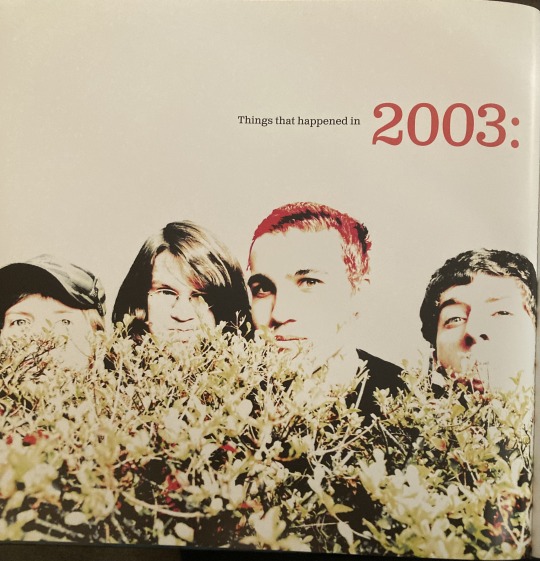
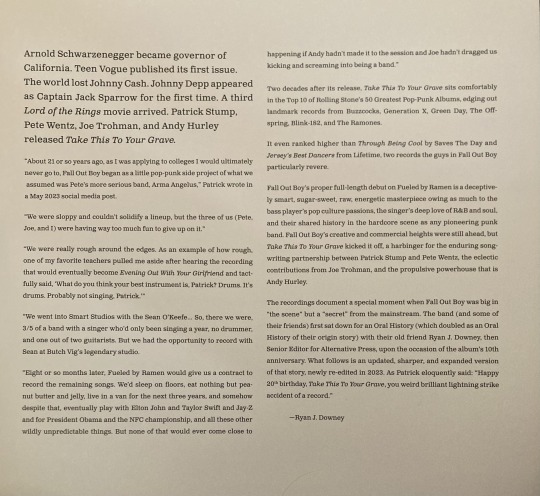
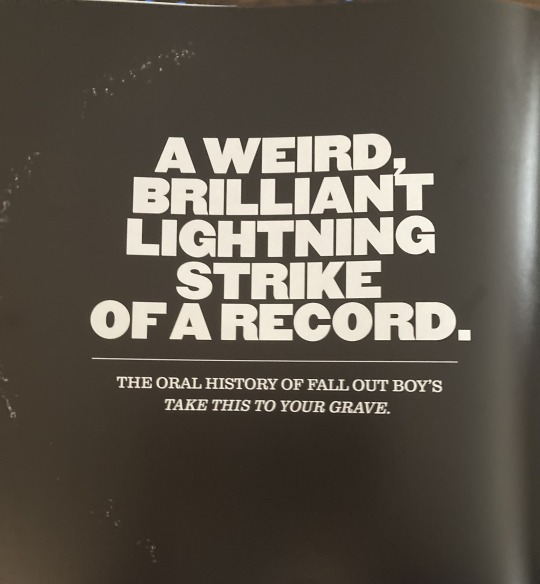
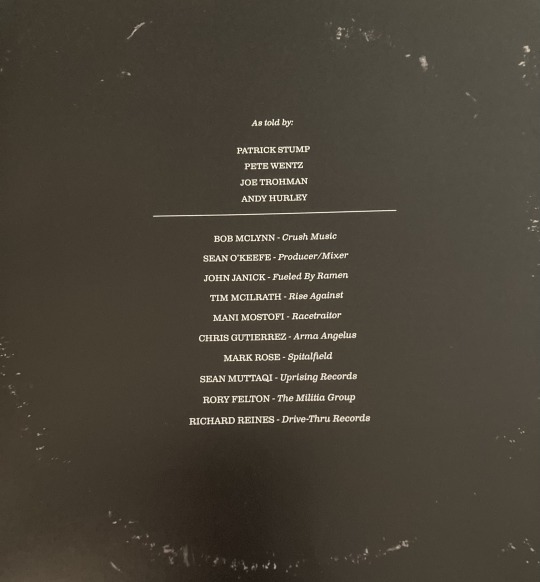
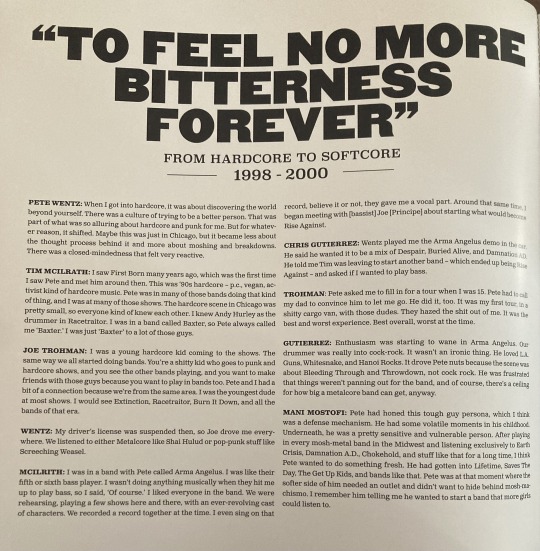
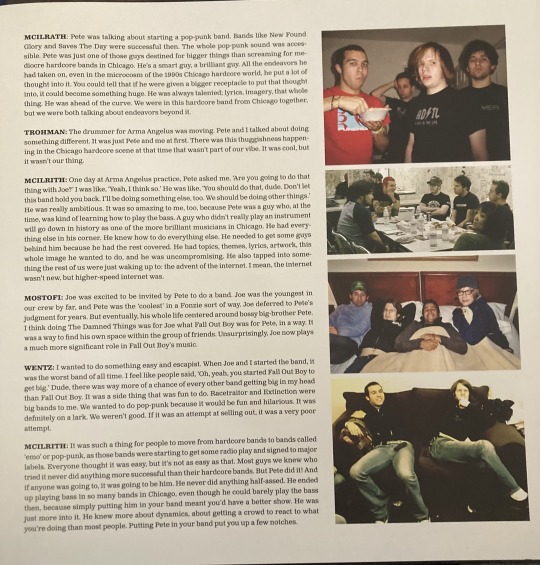

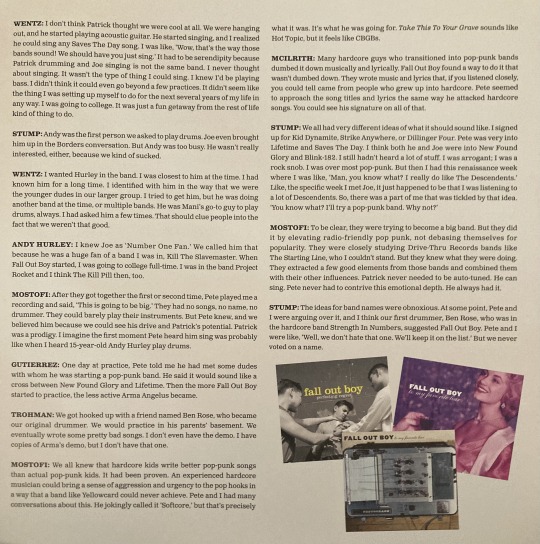
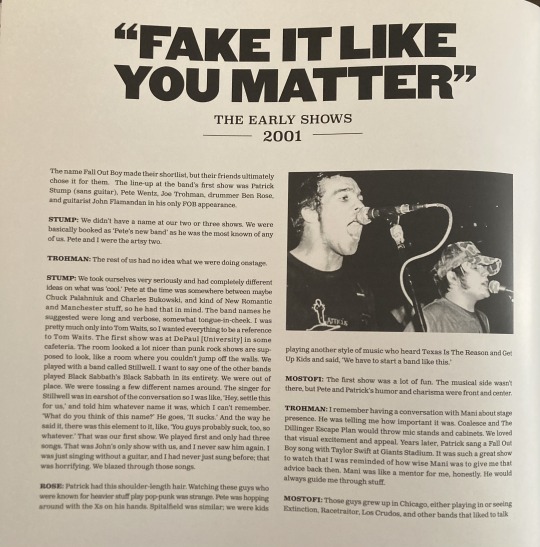
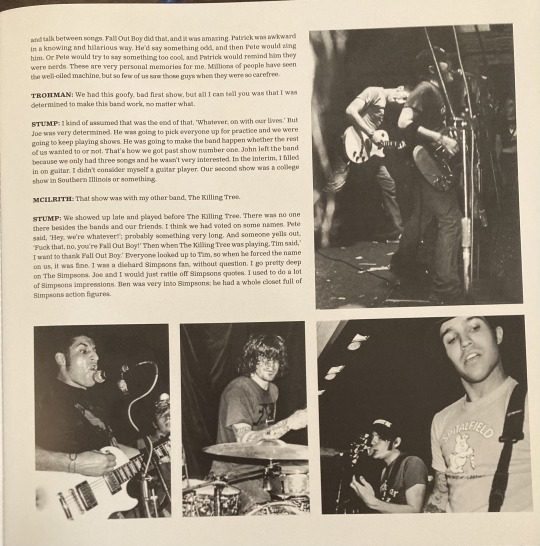
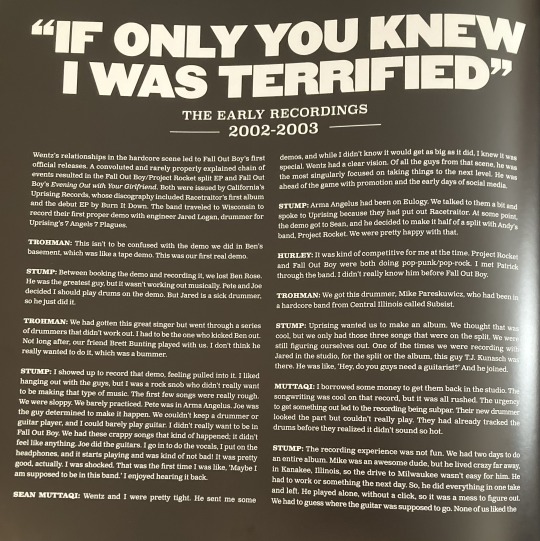
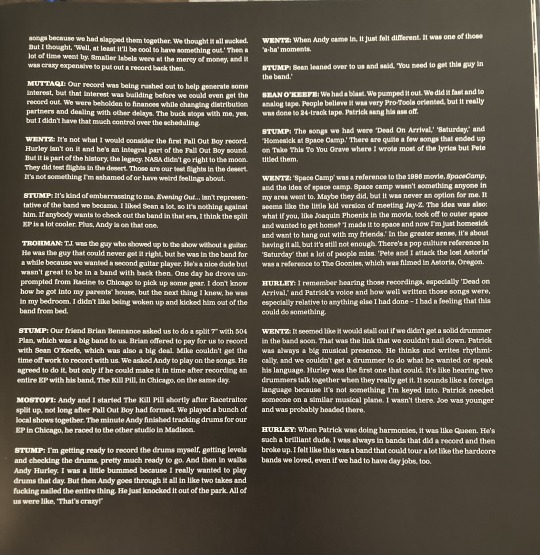
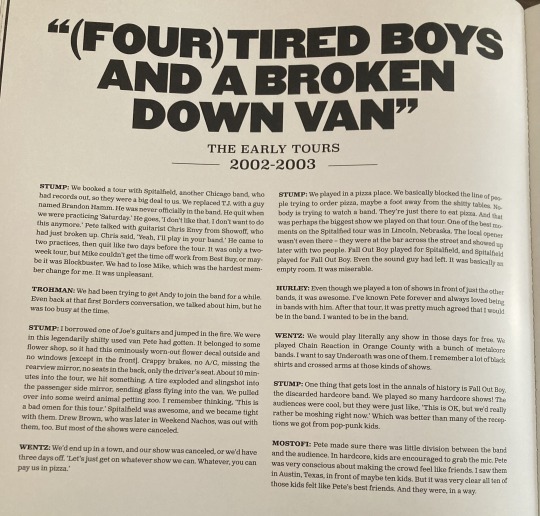
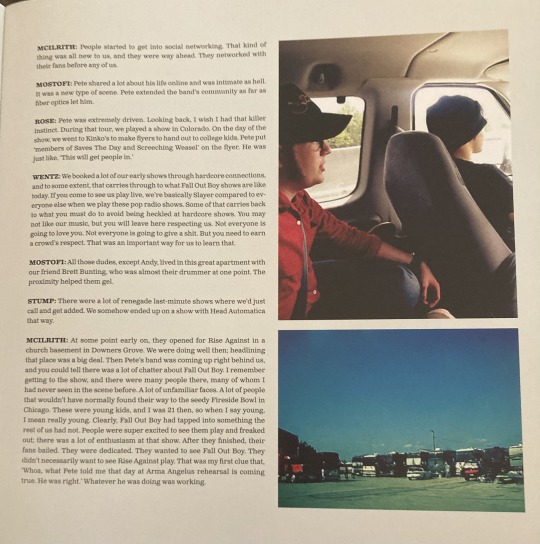
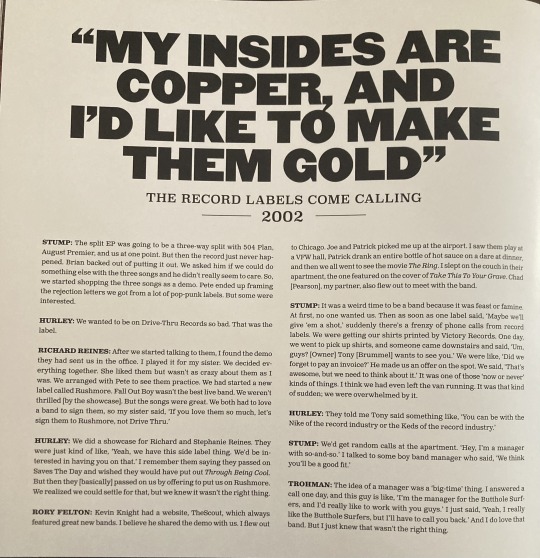
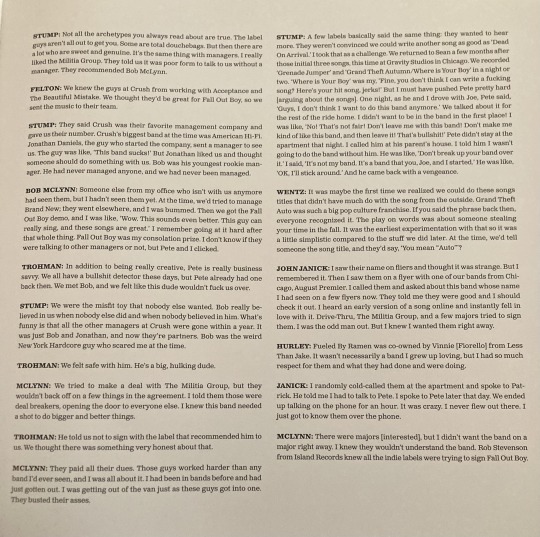
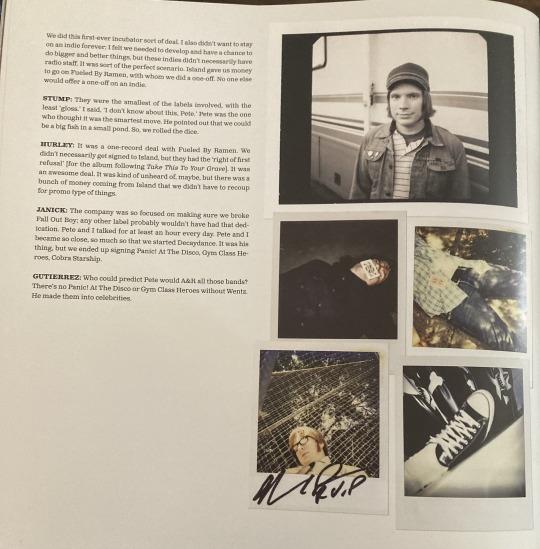
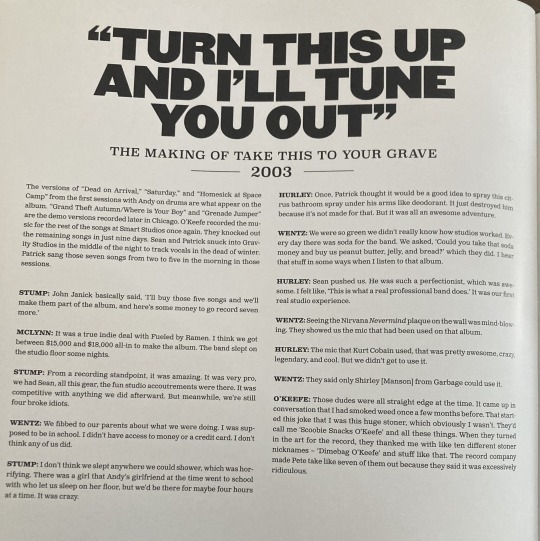
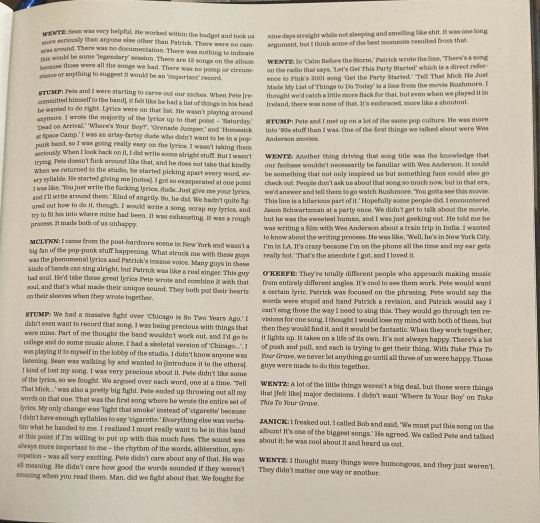
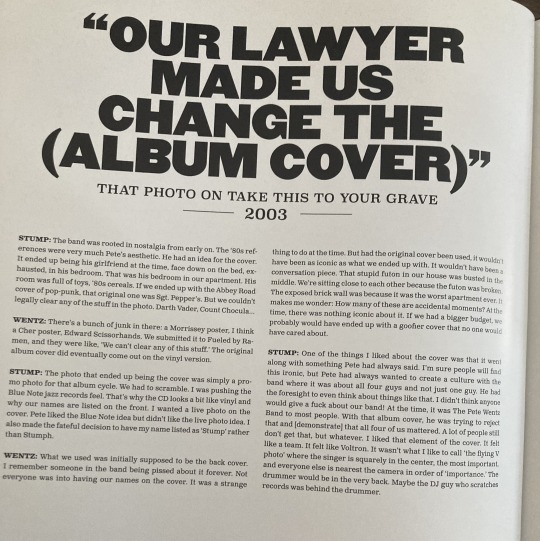
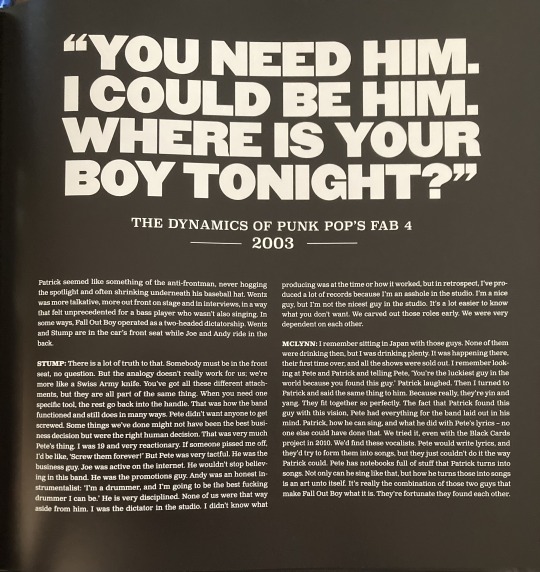
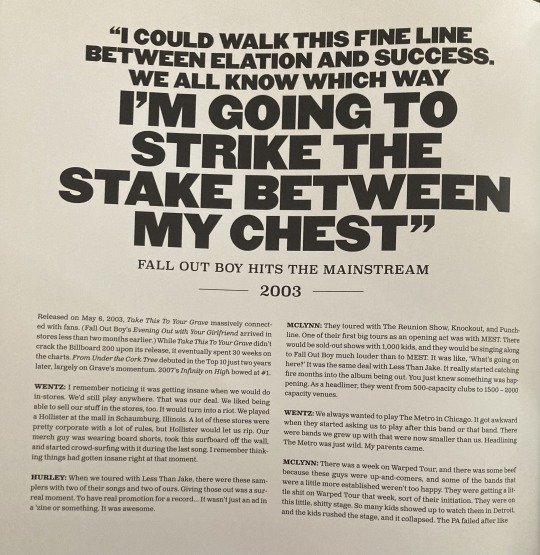
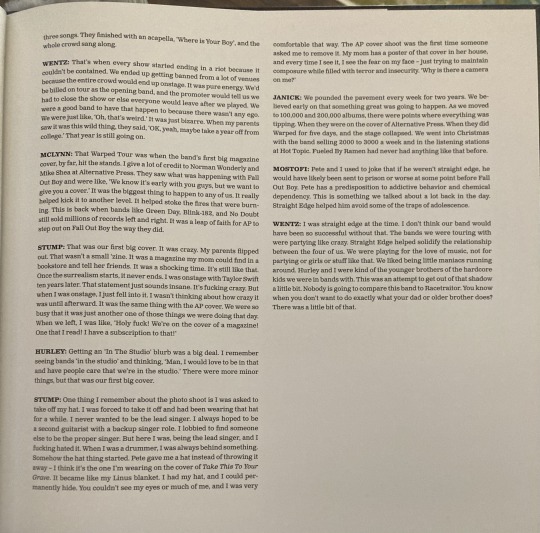
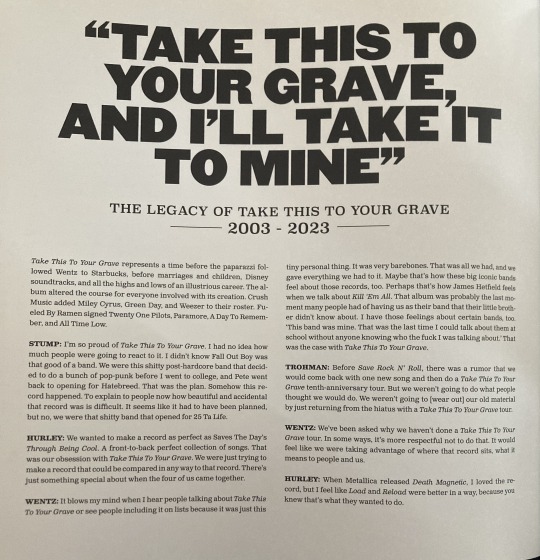
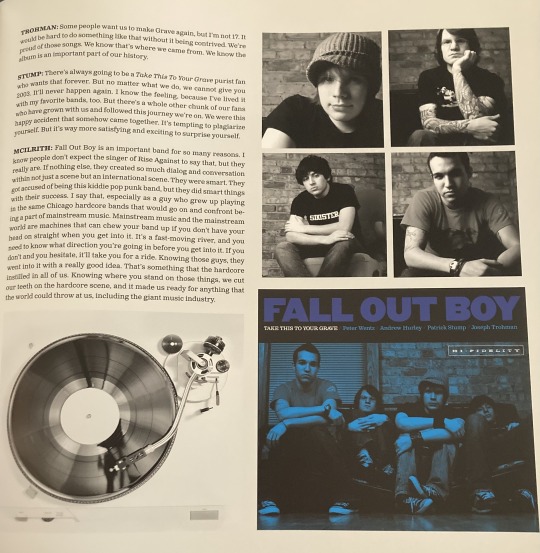
The pages that are just photographs, I haven't included. This post is already long enough.
Things that happened in 2003: Arnold Schwarzenegger became governor of California. Teen Vogue published its first issue. The world lost Johnny Cash. Johnny Depp appeared as Captain Jack Sparrow for the first time. A third Lord of the Rings movie arrived. Patrick Stump, Pete Wentz, Joe Trohman, and Andy Hurley released Take This To Your Grave.
"About 21 years ago or so, as I was applying to colleges I would ultimately never go to, Fall Out Boy began as a little pop-punk side project of what we assumed was Pete's more serious band, Arma Angelus," Patrick wrote in a May 2023 social media post.
"We were sloppy and couldn't solidify a lineup, but the three of us (Pete, Joe, and I) were having way too much fun to give up on it."
"We were really rough around the edges. As an example of how rough, one of my favorite teachers pulled me aside after hearing the recording that would eventually become Evening Out With Your Girlfriend and tactfully said, 'What do you think your best instrument is, Patrick? Drums. It's drums. Probably not singing, Patrick.'"
"We went into Smart Studios with the Sean O'Keefe... So, there we were, 3/5 of a band with a singer who'd only been singing a year, no drummer, and one out of two guitarists. But we had the opportunity to record with Sean at Butch Vig's legendary studio.
"Eight or so months later, Fueled by Ramen would give us a contract to record the remaining songs. We'd sleep on floors, eat nothing but peanut butter and jelly, live in a van for the next three years, and somehow despite that, eventually play with Elton John and Taylor Swift and Jay-Z and for President Obama and the NFC championship, and all these other wildly unpredictable things. But none of that would ever come close to happening if Andy hadn't made it to the session and Joe hadn't dragged us kicking and screaming into being a band."
Two decades after its release, Take This To Your Grave sits comfortable in the Top 10 of Rolling Stone's 50 Greatest Pop-Punk Albums, edging out landmark records from Buzzcocks, Generation X, Green Day, The Offspring, Blink-182, and The Ramones.
It even ranked higher than Through Being Cool by Saves The Day and Jersey's Best Dancers from Lifetime, two records the guys in Fall Out Boy particularly revere.
Fall Out Boy's proper full-length debut on Fueled by Ramen is a deceptively smart, sugar-sweet, raw, energetic masterpiece owing as much to the bass player's pop culture passions, the singers deep love of R&B and soul, and their shared history in the hardcore scene as any pioneering punk band. Fall Out Boy's creative and commercial heights were still ahead, but Take This To Your Grave kicked it off, a harbinger for the enduring songwriting partnership between Patrick Stump and Pete Wentz, the eclectic contributions from Joe Trohman, and the propulsive powerhouse that is Andy Hurley.
The recordings document a special moment when Fall Out Boy was big in "the scene" but a "secret" from the mainstream. The band (and some of their friends) first sat down for an Oral History (which doubled as an Oral History of their origin story) with their old friend Ryan J. Downey, then Senior Editor for Alternative Press, upon the occasion of the album's 10th anniversary. What follows is an updated, sharper, and expanded version of that story, newly re-edited in 2023. As Patrick eloquently said: "Happy 20th birthday, Take This To Your Grave, you weird brilliant lightning strike accident of a record."
– Ryan J. Downey.
A Weird, Brilliant Lightning Strike Of A Record. The Oral History Of Fall Out Boy's Take This To Your Grave.
As told by:
Patrick Stump
Pete Wentz
Joe Trohman
Andy Hurley
Bob McLynn - Crush Music
Sean O'Keefe - Producer/Mixer
John Janick - Fueled By Ramen
Tim McIlrath - Rise Against
Mani Mostofi - Racetraitor
Chris Gutierrez - Arma Angelus
Mark Rose - Spitalfield
Sean Muttaqi - Uprising Records
Rory Felton - The Militia Group
Richard Reines - Drive-Thru Records
"To Feel No More Bitterness Forever" - From Hardcore to Softcore, 1998-2000
PETE WENTZ: When I got into hardcore, it was about discovering the world beyond yourself. There was a culture of trying to be a better person. That was part of what was so alluring about hardcore and punk for me. But for whatever reason, it shifted. Maybe this was just in Chicago, but it became less about the thought process behind it and more about moshing and breakdowns. There was a close-mindedness that felt very reactive.
TIM MCILRITH: I saw First Born many years ago, which was the first time I saw Pete and met him around then. This was '90s hardcore - p.c., vegan, activist kind of hardcore music. Pete was in many of those bands doing that kind of thing, and I was at many of those shows. The hardcore scene in Chicago was pretty small, so everyone kind of knew each other. I knew Andy Hurley as the drummer in Racetraitor. I was in a band called Baxter, so Pete always called me 'Baxter.' I was just 'Baxter' to a lot of those guys.
JOE TROHMAN: I was a young hardcore kid coming to the shows. The same way we all started doing bands. You're a shitty kid who goes to punk and hardcore shows, and you see the other bands playing, and you want to make friends with those guys because you want to play in bands too. Pete and I had a bit of a connection because we're from the same area. I was the youngest dude at most shows. I would see Extinction, Racetraitor, Burn It Down, and all the bands of that era.
WENTZ: My driver's license was suspended then, so Joe drove me everywhere. We listened to either Metalcore like Shai Hulud or pop-punk stuff like Screeching Weasel.
MCILRITH: I was in a band with Pete called Arma Angelus. I was like their fifth or sixth bass player. I wasn't doing anything musically when they hit me up to play bass, so I said, 'Of course.' I liked everyone in the band. We were rehearsing, playing a few shows here and there, with an ever-revolving cast of characters. We recorded a record together at the time. I even sing on that record, believe it or not, they gave me a vocal part. Around that same time, I began meeting with [bassist] Joe [Principe] about starting what would become Rise Against.
CHRIS GUTIERREZ: Wentz played me the Arma Angelus demo in the car. He said he wanted it to be a mix of Despair, Buried Alive, and Damnation A.D. He told me Tim was leaving to start another band - which ended up being Rise Against - and asked if I wanted to play bass.
TROHMAN: Pete asked me to fill in for a tour when I was 15. Pete had to call my dad to convince him to let me go. He did it, too. It was my first tour, in a shitty cargo van, with those dudes. They hazed the shit out of me. It was the best and worst experience. Best overall, worst at the time.
GUTIERREZ: Enthusiasm was starting to wane in Arma Angelus. Our drummer was really into cock-rock. It wasn't an ironic thing. He loved L.A. Guns, Whitesnake, and Hanoi Rocks. It drove Pete nuts because the scene was about Bleeding Through and Throwdown, not cock rock. He was frustrated that things weren't panning out for the band, and of course, there's a ceiling for how big a metalcore band can get, anyway.
MANI MOSTOFI: Pete had honed this tough guy persona, which I think was a defense mechanism. He had some volatile moments in his childhood. Underneath, he was a pretty sensitive and vulnerable person. After playing in every mosh-metal band in the Midwest and listening exclusively to Earth Crisis, Damnation A.D., Chokehold, and stuff like that for a long time, I think Pete wanted to do something fresh. He had gotten into Lifetime, Saves The Day, The Get Up Kids, and bands like that. Pete was at that moment where the softer side of him needed an outlet, and didn't want to hide behind mosh-machismo. I remember him telling me he wanted to start a band that more girls could listen to.
MCILRATH: Pete was talking about starting a pop-punk band. Bands like New Found Glory and Saves The Day were successful then. The whole pop-punk sound was accessible. Pete was just one of those guys destined for bigger things than screaming for mediocre hardcore bands in Chicago. He's a smart guy, a brilliant guy. All the endeavors he had taken on, even in the microcosm of the 1990s Chicago hardcore world, he put a lot of though into it. You could tell that if he were given a bigger receptacle to put that thought into, it could become something huge. He was always talented: lyrics, imagery, that whole thing. He was ahead of the curve. We were in this hardcore band from Chicago together, but we were both talking about endeavors beyond it.
TROHMAN: The drummer for Arma Angelus was moving. Pete and I talked about doing something different. It was just Pete and me at first. There was this thuggishness happening in the Chicago hardcore scene at that time that wasn't part of our vibe. It was cool, but it wasn't our thing.
MCILRITH: One day at Arma Angelus practice, Pete asked me, 'Are you going to do that thing with Joe?' I was like, 'Yeah, I think so.' He was like, 'You should do that, dude. Don't let this band hold you back. I'll be doing something else, too. We should be doing other things.' He was really ambitious. It was so amazing to me, too, because Pete was a guy who, at the time, was kind of learning how to play the bass. A guy who didn't really play an instrument will do down in history as one of the more brilliant musicians in Chicago. He had everything else in his corner. He knew how to do everything else. He needed to get some guys behind him because he had the rest covered. He had topics, themes, lyrics, artwork, this whole image he wanted to do, and he was uncompromising. He also tapped into something the rest of us were just waking up to: the advent of the internet. I mean, the internet wasn't new, but higher-speed internet was.
MOSTOFI: Joe was excited to be invited by Pete to do a band. Joe was the youngest in our crew by far, and Pete was the 'coolest' in a Fonzie sort of way. Joe deferred to Pete's judgement for years. But eventually, his whole life centered around bossy big-brother Pete. I think doing The Damned Things was for Joe what Fall Out Boy was for Pete, in a way. It was a way to find his own space within the group of friends. Unsurprisingly, Joe now plays a much more significant role in Fall Out Boy's music.
WENTZ: I wanted to do something easy and escapist. When Joe and I started the band, it was the worst band of all time. I feel like people said, 'Oh, yeah, you started Fall Out Boy to get big.' Dude, there was way more of a chance of every other band getting big in my head than Fall Out Boy. It was a side thing that was fun to do. Racetraitor and Extinction were big bands to me. We wanted to do pop-punk because it would be fun and hilarious. It was definitely on a lark. We weren't good. If it was an attempt at selling out, it was a very poor attempt.
MCILRITH: It was such a thing for people to move from hardcore bands to bands called 'emo' or pop-punk, as those bands were starting to get some radio play and signed to major labels. Everyone thought it was easy, but it's not as easy as that. Most guys we knew who tried it never did anything more successful than their hardcore bands. But Pete did it! And if anyone was going to, it was going to be him. He never did anything half-assed. He ended up playing bass in so many bands in Chicago, even though he could barely play the bass then, because simply putting him in your band meant you'd have a better show. He was just more into it. He knew more about dynamics, about getting a crowd to react to what you're doing than most people. Putting Pete in your band put you up a few notches.
"I'm Writing You A Chorus And Here Is Your Verse" - When Pete met Patrick, early 2001.
MARK ROSE: Patrick Stump played drums in this grindcore band called Grinding Process. They had put out a live split cassette tape.
PATRICK STUMP: My ambition always outweighed my ability or actual place in the world. I was a drummer and played in many bands and tried to finagle my way into better ones but never really managed. I was usually outgunned by the same two guys: this guy Rocky Senesce; I'm not sure if he's playing anymore, but he was amazing. And this other guy, De'Mar Hamilton, who is now in Plain White T's. We'd always go out for the same bands. I felt like I was pretty good, but then those guys just mopped the floor with me. I hadn't been playing music for a few months. I think my girlfriend dumped me. I was feeling down. I wasn't really into pop-punk or emo. I think at the time I was into Rhino Records box sets.
TROHMAN: I was at the Borders in Eden's Plaza in Wilmette, Illinois. My friend Arthur was asking me about Neurosis. Patrick just walked up and started talking to me.
STUMP: I was a bit arrogant and cocky, like a lot of young musicians. Joe was talking kind of loudly and I overheard him say something about Neurosis, and I think I came in kind of snotty, kind of correcting whatever they had said.
TROHMAN: We just started talking about music, and my buddy Arthur got shoved out of the conversation. I told him about the band we were starting. Pete was this local hardcore celebrity, which intrigued Patrick.
STUMP: I had similar conversations with any number of kids my age. This conversation didn't feel crazy special. That's one of the things that's real about [Joe and I meeting], and that's honest about it, that's it's not some 'love at first sight' thing where we started talking about music and 'Holy smokes, we're going to have the best band ever!' I had been in a lot of bands up until then. Hardcore was a couple of years away from me at that point. I was over it, but Pete was in real bands; that was interesting. Now I'm curious and I want to do this thing, or at least see what happens. Joe said they needed a drummer, guitar player, or singer, and I kind of bluffed and said I could do any one of those things for a pop-punk band. I'd had a lot of conversations about starting bands where I meet up with somebody and maybe try to figure out some songs and then we'd never see each other again. There were a lot of false starts and I assumed this would be just another one of those, but it would be fun for this one to be with the guy from Racetraitor and Extinction.
TROHMAN: He gave me the link to his MP3.com page. There were a few songs of him just playing acoustic and singing. He was awesome.
WENTZ: Joe told me we were going to this kid's house who would probably be our drummer but could also sing. He sent me a link to Patrick singing some acoustic thing, but the quality was so horrible it was hard to tell what it was. Patrick answered the door in some wild outfit. He looked like an emo kid but from the Endpoint era - dorky and cool. We went into the basement, and he was like, trying to set up his drums.
TROHMAN: Patrick has said many times that he intended to try out on drums. I was pushing for him to sing after hearing his demos. 'Hey! Sing for us!' I asked him to take out his acoustic guitar. He played songs from Saves The Day's Through Being Cool. I think he sang most of the record to us. We were thrilled. We had never been around someone who could sing like that.
WENTZ: I don't think Patrick thought we were cool at all. We were hanging out, and he started playing acoustic guitar. He started singing, and I realized he could sing any Saves The Day song. I was like, 'Wow, that's the way those bands sound! We should just have you sing.' It had to be serendipity because Patrick drumming and Joe singing is not the same band. I never thought about singing. It wasn't the type of thing I could sing. I knew I'd be playing bass. I didn't think it'd even go beyond a few practices. It didn't seem like the thing I was setting myself up to do for the next several years of my life in any way. I was going to college. It was just a fun getaway from the rest of life kind of thing to do.
STUMP: Andy was the first person we asked to play drums. Joe even brought him up in the Borders conversation. But Andy was too busy. He wasn't really interested, either, because we kind of sucked.
WENTZ: I wanted Hurley in the band, I was closest to him at the time, I had known him for a long time. I identified with him in the way that we were the younger dudes in our larger group. I tried to get him, but he was doing another band at the time, or multiple bands. He was Mani's go-to guy to play drums, always. I had asked him a few times. That should clue people into the fact that we weren't that good.
ANDY HURLEY: I knew Joe as 'Number One Fan.' We called him that because he was a huge fan of a band I was in, Kill The Slavemaster. When Fall Out Boy started, I was going to college full-time. I was in the band Project Rocket and I think The Kill Pill then, too.
MOSTOFI: After they got together the first or second time, Pete played me a recording and said, 'This is going to be big.' They had no songs, no name, no drummer. They could barely play their instruments. But Pete knew, and we believed him because we could see his drive and Patrick's potential. Patrick was prodigy. I imagine the first moment Pete heard him sing was probably like when I heard 15-year-old Andy Hurley play drums.
GUTIERREZ: One day at practice, Pete told me he had met some dudes with whom he was starting a pop-punk band. He said it would sound like a cross between New Found Glory and Lifetime. Then the more Fall Out Boy started to practice, the less active Arma Angelus became.
TROHMAN: We got hooked up with a friend named Ben Rose, who became our original drummer. We would practice in his parents' basement. We eventually wrote some pretty bad songs. I don't even have the demo. I have copies of Arma's demo, but I don't have that one.
MOSTOFI: We all knew that hardcore kids write better pop-punk songs than actual pop-punk kids. It had been proven. An experienced hardcore musician could bring a sense of aggression and urgency to the pop hooks in a way that a band like Yellowcard could never achieve. Pete and I had many conversations about this. He jokingly called it 'Softcore,' but that's precisely what it was. It's what he was going for. Take This To Your Grave sounds like Hot Topic, but it feels like CBGBs.
MCILRITH: Many hardcore guys who transitioned into pop-punk bands dumbed it down musically and lyrically. Fall Out Boy found a way to do it that wasn't dumbed down. They wrote music and lyrics that, if you listened closely, you could tell came from people who grew up into hardcore. Pete seemed to approach the song titles and lyrics the same way he attacked hardcore songs. You could see his signature on all of that.
STUMP: We all had very different ideas of what it should sound like. I signed up for Kid Dynamite, Strike Anywhere, or Dillinger Four. Pete was very into Lifetime and Saves The Day. I think both he and Joe were into New Found Glory and Blink-182. I still hadn't heard a lot of stuff. I was arrogant; I was a rock snob. I was over most pop-punk. But then I had this renaissance week where I was like, 'Man, you know what? I really do like The Descendents.' Like, the specific week I met Joe, it just happened to be that I was listening to a lot of Descendents. So, there was a part of me that was tickled by that idea. 'You know what? I'll try a pop-punk band. Why not?'
MOSTOFI: To be clear, they were trying to become a big band. But they did it by elevating radio-friendly pop punk, not debasing themselves for popularity. They were closely studying Drive-Thru Records bands like The Starting Line, who I couldn't stand. But they knew what they were doing. They extracted a few good elements from those bands and combined them with their other influences. Patrick never needed to be auto-tuned. He can sing. Pete never had to contrive this emotional depth. He always had it.
STUMP: The ideas for band names were obnoxious. At some point, Pete and I were arguing over it, and I think our first drummer, Ben Rose, who was in the hardcore band Strength In Numbers, suggested Fall Out Boy. Pete and I were like, 'Well, we don't hate that one. We'll keep it on the list.' But we never voted on a name.
"Fake It Like You Matter" - The Early Shows, 2001
The name Fall Out Boy made their shortlist, but their friends ultimately chose it for them. The line-up at the band's first show was Patrick Stump (sans guitar), Pete Wentz, Joe Trohman, drummer Ben Rose, and guitarist John Flamandan in his only FOB appearance.
STUMP: We didn't have a name at our two or three shows. We were basically booked as 'Pete's new band' as he was the most known of any of us. Pete and I were the artsy two.
TROHMAN: The rest of us had no idea what we were doing onstage.
STUMP: We took ourselves very seriously and completely different ideas on what was 'cool.' Pete at the time was somewhere between maybe Chuck Palahniuk and Charles Bukowski, and kind of New Romantic and Manchester stuff, so he had that in mind. The band names he suggested were long and verbose, somewhat tongue-in-cheek. I was pretty much only into Tom Waits, so I wanted everything to be a reference to Tom Waits. The first show was at DePaul [University] in some cafeteria. The room looked a lot nicer than punk rock shows are supposed to look, like a room where you couldn't jump off the walls. We played with a band called Stillwell. I want to say one of the other bands played Black Sabbath's Black Sabbath in its entirety. We were out of place. We were tossing a few different names around. The singer for Stillwell was in earshot of the conversation so I was like 'Hey, settle this for us,' and told him whatever name it was, which I can't remember. 'What do you think of this name?' He goes, 'It sucks.' And the way he said it, there was this element to it, like, 'You guys probably suck, too, so whatever.' That was our first show. We played first and only had three songs. That was John's only show with us, and I never saw him again. I was just singing without a guitar, and I had never just sung before; that was horrifying. We blazed through those songs.
ROSE: Patrick had this shoulder-length hair. Watching these guys who were known for heavier stuff play pop-punk was strange. Pete was hopping around with the X's on his hands. Spitalfield was similar; we were kids playing another style of music who heard Texas Is The Reason and Get Up Kids and said, 'We have to start a band like this.'
MOSTOFI: The first show was a lot of fun. The musical side wasn't there, but Pete and Patrick's humor and charisma were front and center.
TROHMAN: I remember having a conversation with Mani about stage presence. He was telling me how important it was. Coalesce and The Dillinger Escape Plan would throw mic stands and cabinets. We loved that visual excitement and appeal. Years later, Patrick sang a Fall Out Boy song with Taylor Swift at Giants Stadium. It was such a great show to watch that I was reminded of how wise Mani was to give me that advice back then. Mani was like a mentor for me, honestly. He would always guide me through stuff.
MOSTOFI: Those guys grew up in Chicago, either playing in or seeing Extinction, Racetraitor, Los Crudos, and other bands that liked to talk and talk between songs. Fall Out Boy did that, and it was amazing. Patrick was awkward in a knowing and hilarious way. He'd say something odd, and then Pete would zing him. Or Pete would try to say something too cool, and Patrick would remind him they were nerds. These are very personal memories for me. Millions of people have seen the well-oiled machine, but so few of us saw those guys when they were so carefree.
TROHMAN: We had this goofy, bad first show, but all I can tell you was that I was determined to make this band work, no matter what.
STUMP: I kind of assumed that was the end of that. 'Whatever, on with our lives.' But Joe was very determined. He was going to pick us up for practice and we were going to keep playing shows. He was going to make the band happen whether the rest of us wanted to or not. That's how we got past show number one. John left the band because we only had three songs and he wasn't very interested. In the interim, I filled in on guitar. I didn't consider myself a guitar player. Our second show was a college show in Southern Illinois or something.
MCILRITH: That show was with my other band, The Killing Tree.
STUMP: We showed up late and played before The Killing Tree. There was no one there besides the bands and our friends. I think we had voted on some names. Pete said 'Hey, we're whatever!'; probably something very long. And someone yells out, 'Fuck that, no, you're Fall Out Boy!' Then when The Killing Tree was playing, Tim said, 'I want to thank Fall Out Boy.' Everyone looked up to Tim, so when he forced the name on us, it was fine. I was a diehard Simpsons fan, without question. I go pretty deep on The Simpsons. Joe and I would just rattle off Simpsons quotes. I used to do a lot of Simpsons impressions. Ben was very into Simpsons; he had a whole closet full of Simpsons action figures.
"If Only You Knew I Was Terrified" - The Early Recordings, 2002-2003
Wentz's relationships in the hardcore scene led to Fall Out Boy's first official releases. A convoluted and rarely properly explained chain of events resulted in the Fall Out Boy/Project Rocket split EP and Fall Out Boy's Evening Out with Your Girlfriend. Both were issued by California's Uprising Records, whose discography included Racetraitor's first album and the debut EP by Burn It Down. The band traveled to Wisconsin to record their first proper demo with engineer Jared Logan, drummer for Uprising's 7 Angels 7 Plagues.
TROHMAN: This isn't to be confused with the demo we did in Ben's basement, which was like a tape demo. This was our first real demo.
STUMP: Between booking the demo and recording it, we lost Ben Rose. He was the greatest guy, but it wasn't working out musically. Pete and Joe decided I should play drums on the demo. But Jared is a sick drummer, so he just did it.
TROHMAN: We had gotten this great singer but went through a series of drummers that didn't work out. I had to be the one who kicked Ben out. Not long after, our friend Brett Bunting played with us. I don't think he really wanted to do it, which was a bummer.
STUMP: I showed up to record that demo, feeling pulled into it. I liked hanging out with the guys, but I was a rock snob who didn't really want to be making that type of music. The first few songs were really rough. We were sloppy. We barely practiced. Pete was in Arma Angelus. Joe was the guy determined to make it happen. We couldn't keep a drummer or guitar player, and I could barely play guitar. I didn't really want to be in Fall Out Boy. We had these crappy songs that kind of happened; it didn't feel like anything. Joe did the guitars. I go in to do the vocals, I put on the headphones, and it starts playing and was kind of not bad! It was pretty good, actually. I was shocked. That was the first time I was like, 'Maybe I am supposed to be in this band.' I enjoyed hearing it back.
SEAN MUTTAQI: Wentz and I were pretty tight. He sent me some demos, and while I didn't know it would get as big as it did, I knew it was special. Wentz had a clear vision. Of all the guys from that scene, he was the most singularly focused on taking things to the next level. He was ahead of the game with promotion and the early days of social media.
STUMP: Arma Angelus had been on Eulogy. We talked to them a bit and spoke to Uprising because they had put out Racetraitor. At some point, the demo got to Sean, and he decided to make it half of a split with Andy's band, Project Rocket. We were pretty happy with that.
HURLEY: It was kind of competitive for me at the time. Project Rocket and Fall Out Boy were both doing pop-punk/pop-rock, I met Patrick through the band. I didn't really know him before Fall Out Boy.
TROHMAN: We got this drummer, Mike Pareskuwicz, who had been in a hardcore band from Central Illinois called Subsist.
STUMP: Uprising wanted us to make an album. We thought that was cool, but we only had those three songs that were on the split. We were still figuring ourselves out. One of the times we were recording with Jared in the studio, for the split or the album, this guy T.J. Kunasch was there. He was like, 'Hey, do you guys need a guitarist?' And he joined.
MUTTAQI: I borrowed some money to get them back in the studio. The songwriting was cool on that record, but it was all rushed. The urgency to get something out led to the recording being subpar. Their new drummer looked the part but couldn't really play. They had already tracked the drums before they realized it didn't sound so hot.
STUMP: The recording experience was not fun. We had two days to do an entire album. Mike was an awesome dude, but he lived crazy far away, in Kanakee, Illinois, so the drive to Milwaukee wasn't easy for him. He had to work or something the next day. So, he did everything in one take and left. He played alone, without a click, so it was a ness to figure out. We had to guess where the guitar was supposed to go. None of us liked the songs because we had slapped them together. We thought it all sucked. But I thought, 'Well, at least it'll be cool to have something out.' Then a lot of time went by. Smaller labels were at the mercy of money, and it was crazy expensive to put out a record back then.
MUTTAQI: Our record was being rushed out to help generate some interest, but that interest was building before we could even get the record out. We were beholden to finances while changing distribution partners and dealing with other delays. The buck stops with me, yes, but I didn't have that much control over the scheduling.
WENTZ: It's not what I would consider the first Fall Out Boy record. Hurley isn't on it and he's an integral part of the Fall Out Boy sound. But it is part of the history, the legacy. NASA didn't go right to the moon. They did test flights in the desert. Those are our test flights in the desert. It's not something I'm ashamed of or have weird feelings about.
STUMP: It's kind of embarrassing to me. Evening Out... isn't representative of the band we became. I liked Sean a lot, so it's nothing against him. If anybody wants to check out the band in that era, I think the split EP is a lot cooler. Plus, Andy is on that one.
TROHMAN: T.J. was the guy who showed up to the show without a guitar. He was the guy that could never get it right, but he was in the band for a while because we wanted a second guitar player. He's a nice dude but wasn't great to be in a band with back then. One day he drove unprompted from Racine to Chicago to pick up some gear. I don't know how he got into my parents' house, but the next thing I knew, he was in my bedroom. I didn't like being woken up and kicked him out of the band from bed.
STUMP: Our friend Brian Bennance asked us to do a split 7" with 504 Plan, which was a big band to us. Brian offered to pay for us to record with Sean O'Keefe, which was also a big deal. Mike couldn't get the time off work to record with us. We asked Andy to play on the songs. He agreed to do it, but only if he could make it in time after recording an entire EP with his band, The Kill Pill, in Chicago, on the same day.
MOSTOFI: Andy and I started The Kill Pill shortly after Racetraitor split up, not long after Fall Out Boy had formed. We played a bunch of local shows together. The minute Andy finished tracking drums for our EP in Chicago, he raced to the other studio in Madison.
STUMP: I'm getting ready to record the drums myself, getting levels and checking the drums, pretty much ready to go. And then in walks Andy Hurley. I was a little bummed because I really wanted to play drums that day. But then Andy goes through it all in like two takes and fucking nailed the entire thing. He just knocked it out of the park. All of us were like, 'That's crazy!'
WENTZ: When Andy came in, It just felt different. It was one of those 'a-ha' moments.
STUMP: Sean leaned over to us and said, 'You need to get this guy in the band.'
SEAN O'KEEFE: We had a blast. We pumped It out. We did it fast and to analog tape. People believe it was very Pro Tools oriented, but it really was done to 24-track tape. Patrick sang his ass off.
STUMP: The songs we had were 'Dead On Arrival,' 'Saturday,' and 'Homesick at Space Camp. There are quite a few songs that ended up on Take This To You Grave where I wrote most of the lyrics but Pete titled them.
WENTZ: 'Space Camp' was a reference to the 1986 movie, SpaceCamp, and the idea of space camp. Space camp wasn't something anyone in my area went to. Maybe they did, but it was never an option for me. It seems like the little kid version of meeting Jay-Z. The idea was also: what if you, like Joaquin Phoenix in the movie, took off to outer space and wanted to get home? 'I made it to space and now I'm just homesick and want to hang out with my friends.' In the greater sense, it's about having it all, but it's still not enough. There's a pop culture reference in 'Saturday' that a lot of people miss. 'Pete and I attack the lost Astoria' was a reference to The Goonies, which was filmed in Astoria, Oregon.
HURLEY: I remember hearing those recordings, especially 'Dead on Arrival,' and Patrick's voice and how well written those songs were, especially relative to anything else I had done - I had a feeling that this could do something.
WENTZ: It seemed like it would stall out if we didn't get a solid drummer in the band soon. That was the link that we couldn't nail down. Patrick was always a big musical presence. He thinks and writes rhythmi-cally, and we couldn't get a drummer to do what he wanted or speak his language. Hurley was the first one that could. It's like hearing two drummers talk together when they really get it. It sounds like a foreign language because it's not something I'm keyed into. Patrick needed someone on a similar musical plane. I wasn't there. Joe was younger and was probably headed there.
HURLEY: When Patrick was doing harmonies, it was like Queen. He's such a brilliant dude. I was always in bands that did a record and then broke up. I felt like this was a band that could tour a lot like the hardcore bands we loved, even if we had to have day jobs, too.
"(Four) Tired Boys And A Broken Down Van" - The Early Tours, 2002-2003
STUMP: We booked a tour with Spitalfield, another Chicago band, who had records out, so they were a big deal to us. We replaced T.J. with a guy named Brandon Hamm. He was never officially in the band. He quit when we were practicing 'Saturday.' He goes, 'I don't like that. I don't want to do this anymore.' Pete talked with guitarist Chris Envy from Showoff, who had just broken up. Chris said, 'Yeah, I'll play in your band.' He came to two practices, then quit like two days before the tour. It was only a two-week tour, but Mike couldn't get the time off work from Best Buy, or maybe it was Blockbuster. We had to lose Mike, which was the hardest member change for me. It was unpleasant.
TROHMAN: We had been trying to get Andy to join the band for a while. Even back at that first Borders conversation, we talked about him, but he was too busy at the time.
STUMP: I borrowed one of Joe's guitars and jumped in the fire. We were in this legendarily shitty used van Pete had gotten. It belonged to some flower shop, so it had this ominously worn-out flower decal outside and no windows [except in the front]. Crappy brakes, no A/C, missing the rearview mirror, no seats in the back, only the driver's seat. About 10 minutes into the tour, we hit something. A tire exploded and slingshot into the passenger side mirror, sending glass flying into the van. We pulled over into some weird animal petting zoo. I remember thinking, 'This is a bad omen for this tour.' Spitalfield was awesome, and we became tight with them. Drew Brown, who was later in Weekend Nachos, was out with them, too. But most of the shows were canceled.
WENTZ: We'd end up in a town, and our show was canceled, or we'd have three days off. 'Let's just get on whatever show we can. Whatever, you can pay us in pizza.'
STUMP: We played in a pizza place. We basically blocked the line of people trying to order pizza, maybe a foot away from the shitty tables. Nobody is trying to watch a band. They're just there to eat pizza. And that was perhaps the biggest show we played on that tour. One of the best moments on the Spitalfied tour was in Lincoln, Nebraska. The local opener wasn't even there - they were at the bar across the street and showed up later with two people. Fall Out Boy played for Spitalfield, and Spitalfield played for Fall Out Boy. Even the sound guy had left. It was basically an empty room. It was miserable.
HURLEY: Even though we played a ton of shows in front of just the other bands, it was awesome. I've known Pete forever and always loved being in bands with him. After that tour, it was pretty much agreed that I would be in the band. I wanted to be in the band.
WENTZ: We would play literally any show in those days for free. We played Chain Reaction in Orange County with a bunch of metalcore bands. I want to say Underoath was one of them. I remember a lot of black shirts and crossed arms at those kinds of shows. STUMP: One thing that gets lost in the annals of history is Fall Out Boy, the discarded hardcore band. We played so many hardcore shows! The audiences were cool, but they were just like, 'This is OK, but we'd really rather be moshing right now.' Which was better than many of the receptions we got from pop-punk kids.
MOSTOFI: Pete made sure there was little division between the band and the audience. In hardcore, kids are encouraged to grab the mic. Pete was very conscious about making the crowd feel like friends. I saw them in Austin, Texas, in front of maybe ten kids. But it was very clear all ten of those kids felt like Pete's best friends. And they were, in a way.
MCILRITH: People started to get into social networking. That kind of thing was all new to us, and they were way ahead. They networked with their fans before any of us.
MOSTOFI: Pete shared a lot about his life online and was intimate as hell. It was a new type of scene. Pete extended the band's community as far as fiber optics let him.
ROSE: Pete was extremely driven. Looking back, I wish I had that killer instinct. During that tour; we played a show in Colorado. On the day of the show, we went to Kinko's to make flyers to hand out to college kids. Pete put ‘members of Saves The Day and Screeching Weasel’ on the flyer. He was just like, 'This will get people in.'
WENTZ: We booked a lot of our early shows through hardcore connections, and to some extent, that carries through to what Fall Out Boy shows are like today. If you come to see us play live, we're basically Slayer compared to everyone else when we play these pop radio shows. Some of that carries back to what you must do to avoid being heckled at hardcore shows. You may not like our music, but you will leave here respecting us. Not everyone is going to love you. Not everyone is going to give a shit. But you need to earn a crowd's respect. That was an important way for us to learn that.
MOSTOFI: All those dudes, except Andy, lived in this great apartment with our friend Brett Bunting, who was almost their drummer at one point. The proximity helped them gel.
STUMP: There were a lot of renegade last-minute shows where we'd just call and get added. We somehow ended up on a show with Head Automatica that way.
MCILRITH: At some point early on, they opened for Rise Against in a church basement in Downers Grove. We were doing well then; headlining that place was a big deal. Then Pete's band was coming up right behind us, and you could tell there was a lot of chatter about Fall Out Boy. I remember getting to the show, and there were many people there, many of whom I had never seen in the scene before. A lot of unfamiliar faces. A lot of people that wouldn't have normally found their way to the seedy Fireside Bowl in Chicago. These were young kids, and I was 21 then, so when I say young, I mean really young. Clearly, Fall Out Boy had tapped into something the rest of us had not. People were super excited to see them play and freaked out; there was a lot of enthusiasm at that show. After they finished, their fans bailed. They were dedicated. They wanted to see Fall Out Boy. They didn't necessarily want to see Rise Against play. That was my first clue that, 'Whoa, what Pete told me that day at Arma Angelus rehearsal is coming true. He was right.' Whatever he was doing was working.
"My Insides Are Copper, And I'd Like To Make Them Gold" - The Record Labels Come Calling, 2002
STUMP: The split EP was going to be a three-way split with 504 Plan, August Premier, and us at one point. But then the record just never happened. Brian backed out of putting it out. We asked him if we could do something else with the three songs and he didn't really seem to care. So, we started shopping the three songs as a demo. Pete ended up framing the rejection letters we got from a lot of pop-punk labels. But some were interested.
HURLEY: We wanted to be on Drive-Thru Records so bad. That was the label.
RICHARD REINES: After we started talking to them, I found the demo they had sent us in the office. I played it for my sister. We decided everything together. She liked them but wasn't as crazy about them as I was. We arranged with Pete to see them practice. We had started a new label called Rushmore. Fall Out Boy wasn't the best live band. We weren't thrilled [by the showcase]. But the songs were great. We both had to love a band to sign them, so my sister said, 'If you love them so much, let's sign them to Rushmore, not Drive Thru.'
HURLEY: We did a showcase for Richard and Stephanie Reines. They were just kind of like, 'Yeah, we have this side label thing. We'd be interested in having you on that.' I remember them saying they passed on Saves The Day and wished they would have put out Through Being Cool. But then they [basically] passed on us by offering to put us on Rushmore. We realized we could settle for that, but we knew it wasn't the right thing.
RORY FELTON: Kevin Knight had a website, TheScout, which always featured great new bands. I believe he shared the demo with us. I flew out to Chicago. Joe and Patrick picked me up at the airport. I saw them play at a VFW hall, Patrick drank an entire bottle of hot sauce on a dare at dinner, and then we all went to see the movie The Ring. I slept on the couch in their apartment, the one featured on the cover of Take This To Your Grave. Chad [Pearson], my partner, also flew out to meet with the band.
STUMP: It was a weird time to be a band because it was feast or famine. At first, no one wanted us. Then as soon as one label said, 'Maybe we'll give 'em a shot,' suddenly there's a frenzy of phone calls from record labels. We were getting our shirts printed by Victory Records. One day, we went to pick up shirts, and someone came downstairs and said, 'Um, guys? [Owner] Tony [Brummel] wants to see you.' We were like, 'Did we forget to pay an invoice?' He made us an offer on the spot. We said, 'That's awesome, but we need to think about it.' It was one of those 'now or never' kinds of things. I think we had even left the van running. It was that kind of sudden; we were overwhelmed by it.
HURLEY: They told me Tony said something like, 'You can be with the Nike of the record industry or the Keds of the record industry.'
STUMP: We'd get random calls at the apartment. 'Hey, I'm a manager with so-and-so.' I talked to some boy band manager who said, 'We think you'll be a good fit.'
TROHMAN: The idea of a manager was a ‘big-time' thing. I answered a call one day, and this guy is like, 'I'm the manager for the Butthole Surfers, and I'd really like to work with you guys.' I just said, Yeah, I really like the Butthole Surfers, but I'll have to call you back.' And I do love that band. But I just knew that wasn't the right thing.
STUMP: Not all the archetypes you always read about are true. The label guys aren't all out to get you. Some are total douchebags. But then there are a lot who are sweet and genuine. It's the same thing with managers. I really liked the Militia Group. They told us it was poor form to talk to us without a manager. They recommended Bob McLynn.
FELTON: We knew the guys at Crush from working with Acceptance and The Beautiful Mistake. We thought they'd be great for Fall Out Boy, so we sent the music to their team.
STUMP: They said Crush was their favorite management company and gave us their number. Crush's biggest band at the time was American Hi-Fi. Jonathan Daniels, the guy who started the company, sent a manager to see us. The guy was like, "This band sucks!' But Jonathan liked us and thought someone should do something with us. Bob was his youngest rookie manager. He had never managed anyone, and we had never been managed.
BOB MCLYNN: Someone else from my office who isn't with us anymore had seen them, but I hadn't seen them yet. At the time, we'd tried to manage Brand New; they went elsewhere, and I was bummed. Then we got the Fall Out Boy demo, and I was like, Wow. This sounds even better. This guy can really sing, and these songs are great.' I remember going at it hard after that whole thing. Fall Out Boy was my consolation prize. I don't know if they were talking to other managers or not, but Pete and I clicked.
TROHMAN: In addition to being really creative, Pete is really business savvy. We all have a bullshit detector these days, but Pete already had one back then. We met Bob, and we felt like this dude wouldn't fuck us over.
STUMP: We were the misfit toy that nobody else wanted. Bob really believed in us when nobody else did and when nobody believed in him. What's funny is that all the other managers at Crush were gone within a year. It was just Bob and Jonathan, and now they're partners. Bob was the weird New York Hardcore guy who scared me at the time.
TROHMAN: We felt safe with him. He's a big, hulking dude.
MCLYNN: We tried to make a deal with The Militia Group, but they wouldn't back off on a few things in the agreement. I told them those were deal breakers, opening the door to everyone else. I knew this band needed a shot to do bigger and better things.
TROHMAN: He told us not to sign with the label that recommended him to us. We thought there was something very honest about that.
MCLYNN: They paid all their dues. Those guys worked harder than any band I'd ever seen, and I was all about it. I had been in bands before and had just gotten out. I was getting out of the van just as these guys got into one. They busted their asses.
STUMP: A few labels basically said the same thing: they wanted to hear more. They weren't convinced we could write another song as good as 'Dead On Arrival.' I took that as a challenge. We returned to Sean a few months after those initial three songs, this time at Gravity Studios in Chicago. We recorded ‘Grenade Jumper' and 'Grand Theft Autumn/Where is Your Boy' in a night or two. 'Where is Your Boy' was my, 'Fine, you don't think I can write a fucking song? Here's your hit song, jerks!' But I must have pushed Pete pretty hard [arguing about the songs]. One night, as he and I drove with Joe, Pete said, 'Guys, I don't think I want to do this band anymore.' We talked about it for the rest of the ride home. I didn't want to be in the band in the first place! I was like, 'No! That's not fair! Don't leave me with this band! Don't make me kind of like this band, and then leave it! That's bullshit!' Pete didn't stay at the apartment that night. I called him at his parent's house. I told him I wasn't going to do the band without him. He was like, 'Don't break up your band over it.' I said, 'It's not my band. It's a band that you, Joe, and I started.' He was like, 'OK, I'll stick around.' And he came back with a vengeance.
WENTZ: It was maybe the first time we realized we could do these songs titles that didn't have much do with the song from the outside. Grand Theft Auto was such a big pop culture franchise. If you said the phrase back then, everyone recognized it. The play on words was about someone stealing your time in the fall. It was the earliest experimentation with that so it was a little simplistic compared to the stuff we did later. At the time, we'd tell someone the song title, and they'd say, 'You mean "Auto"'?
JOHN JANICK: I saw their name on fliers and thought it was strange. But I remembered it. Then I saw them on a flyer with one of our bands from Chicago, August Premier. I called them and asked about this band whose name I had seen on a few flyers now. They told me they were good and I should check it out. I heard an early version of a song online and instantly fell in love with it. Drive-Thru, The Militia Group, and a few majors tried to sign them. I was the odd man out. But I knew I wanted them right away.
HURLEY: Fueled By Ramen was co-owned by Vinnie [Fiorello] from Less Than Jake. It wasn't necessarily a band I grew up loving, but I had so much respect for them and what they had done and were doing.
JANICK: I randomly cold-called them at the apartment and spoke to Patrick. He told me I had to talk to Pete. I spoke to Pete later that day. We ended up talking on the phone for an hour. It was crazy. I never flew out there. I just got to know them over the phone.
MCLYNN: There were majors [interested], but I didn't want the band on a major right away. I knew they wouldn't understand the band. Rob Stevenson from Island Records knew all the indie labels were trying to sign Fall Out Boy. We did this first-ever incubator sort of deal. I also didn't want to stay on an indie forever; I felt we needed to develop and have a chance to do bigger and better things, but these indies didn't necessarily have radio staff. It was sort of the perfect scenario. Island gave us money to go on Fueled By Ramen, with whom we did a one-off. No one else would offer a one-off on an indie.
STUMP: They were the smallest of the labels involved, with the least 'gloss.' I said, 'I don't know about this, Pete.' Pete was the one who thought it was the smartest move. He pointed out that we could be a big fish in a small pond. So, we rolled the dice.
HURLEY: It was a one-record deal with Fueled By Ramen. We didn't necessarily get signed to Island, but they had the 'right of first refusal' [for the album following Take This To Your Grave]. It was an awesome deal. It was kind of unheard of, maybe, but there was a bunch of money coming from Island that we didn't have to recoup for promo type of things.
JANICK: The company was so focused on making sure we broke Fall Out Boy; any other label probably wouldn't have had that dedication. Pete and I talked for at least an hour every day. Pete and I became so close, so much so that we started Decaydance. It was his thing, but we ended up signing Panic! At The Disco, Gym Class Heroes, Cobra Starship.
GUTIERREZ: Who could predict Pete would A&R all those bands? There's no Panic! At The Disco or Gym Class Heroes without Wentz. He made them into celebrities.
"Turn This Up And I'll Tune You Out" - The Making of Take This To You Grave, 2003
The versions of "Dead on Arrival," "Saturday," and "Homesick at Space Camp" from the first sessions with Andy on drums are what appear on the album. "Grand Theft Autumn/Where is Your Boy" and "Grenade Jumper" are the demo versions recorded later in Chicago. O'Keefe recorded the music for the rest of the songs at Smart Studios once again. They knocked out the remaining songs in just nine days. Sean and Patrick snuck into Gravity Studios in the middle of the night to track vocals in the dead of winter. Patrick sang those seven songs from two to five in the morning in those sessions.
STUMP: John Janick basically said, ‘I'll buy those five songs and we'll make them part of the album, and here's some money to go record seven more.'
MCLYNN: It was a true indie deal with Fueled by Ramen. I think we got between $15,000 and $18,000 all-in to make the album. The band slept on the studio floor some nights.
STUMP: From a recording standpoint, it was amazing. It was very pro, we had Sean, all this gear, the fun studio accoutrements were there. It was competitive with anything we did afterward. But meanwhile, we're still four broke idiots.
WENTZ: We fibbed to our parents about what we were doing. I was supposed to be in school. I didn't have access to money or a credit card. I don't think any of us did.
STUMP: I don't think we slept anywhere we could shower, which was horrifying. There was a girl that Andy's girlfriend at the time went to school with who let us sleep on her floor, but we'd be there for maybe four hours at a time. It was crazy.
HURLEY: Once, Patrick thought it would be a good idea to spray this citrus bathroom spray under his arms like deodorant. It just destroyed him because it's not made for that. But it was all an awesome adventure.
WENTZ: We were so green we didn't really know how studios worked. Every day there was soda for the band. We asked, 'Could you take that soda money and buy us peanut butter, jelly, and bread?' which they did. I hear that stuff in some ways when I listen to that album.
HURLEY: Sean pushed us. He was such a perfectionist, which was awesome. I felt like, ‘This is what a real professional band does.' It was our first real studio experience.
WENTZ: Seeing the Nirvana Nevermind plaque on the wall was mind-blowing. They showed us the mic that had been used on that album.
HURLEY: The mic that Kurt Cobain used, that was pretty awesome, crazy, legendary, and cool. But we didn't get to use it.
WENTZ: They said only Shirley Manson] from Garbage could use it.
O'KEEFE: Those dudes were all straight edge at the time. It came up in conversation that I had smoked weed once a few months before. That started this joke that I was this huge stoner, which obviously I wasn't. They'd call me 'Scoobie Snacks O'Keefe' and all these things. When they turned in the art for the record, they thanked me with like ten different stoner nicknames - 'Dimebag O'Keefe' and stuff like that. The record company made Pete take like seven of them out because they said it was excessively ridiculous.
WENTZ: Sean was very helpful. He worked within the budget and took us more seriously than anyone else other than Patrick. There were no cameras around. There was no documentation. There was nothing to indicate this would be some ‘legendary' session. There are 12 songs on the album because those were all the songs we had. There was no pomp or circumstance or anything to suggest it would be an 'important’ record.
STUMP: Pete and I were starting to carve out our niches. When Pete [re-committed himself to the band], it felt like he had a list of things in his head he wanted to do right. Lyrics were on that list. He wasn't playing around anymore. I wrote the majority of the lyrics up to that point - ‘Saturday,' 'Dead on Arrival,' ‘Where's Your Boy?,’ ‘Grenade Jumper,' and ‘Homesick at Space Camp.' I was an artsy-fartsy dude who didn't want to be in a pop-punk band, so I was going really easy on the lyrics. I wasn't taking them seriously. When I look back on it, I did write some alright stuff. But I wasn't trying. Pete doesn't fuck around like that, and he does not take that kindly. When we returned to the studio, he started picking apart every word, every syllable. He started giving me [notes]. I got so exasperated at one point I was like, ‘You just write the fucking lyrics, dude. Just give me your lyrics, and I'll write around them.' Kind of angrily. So, he did. We hadn't quite figured out how to do it, though. I would write a song, scrap my lyrics, and try to fit his into where mine had been. It was exhausting. It was a rough process. It made both of us unhappy.
MCLYNN: I came from the post-hardcore scene in New York and wasn't a big fan of the pop-punk stuff happening. What struck me with these guys was the phenomenal lyrics and Patrick's insane voice. Many guys in these kinds of bands can sing alright, but Patrick was like a real singer. This guy had soul. He'd take these great lyrics Pete wrote and combine it with that soul, and that's what made their unique sound. They both put their hearts on their sleeves when they wrote together.
STUMP: We had a massive fight over 'Chicago is So Two Years Ago.' I didn't even want to record that song. I was being precious with things that were mine. Part of me thought the band wouldn't work out, and I'd go to college and do some music alone. I had a skeletal version of 'Chicago...'. I was playing it to myself in the lobby of the studio. I didn't know anyone was listening. Sean was walking by and wanted to [introduce it to the others]. I kind of lost my song. I was very precious about it. Pete didn't like some of the lyrics, so we fought. We argued over each word, one at a time. 'Tell That Mick...' was also a pretty big fight. Pete ended up throwing out all my words on that one. That was the first song where he wrote the entire set of lyrics. My only change was light that smoke' instead of ‘cigarette' because I didn't have enough syllables to say 'cigarette.' Everything else was verbatim what he handed to me. I realized I must really want to be in this band at this point if I'm willing to put up with this much fuss. The sound was always more important to me - the rhythm of the words, alliteration, syncopation - was all very exciting. Pete didn't care about any of that. He was all meaning. He didn't care how good the words sounded if they weren't amazing when you read them. Man, did we fight about that. We fought for nine days straight while not sleeping and smelling like shit. It was one long argument, but I think some of the best moments resulted from that.
WENTZ: In 'Calm Before the Storm,' Patrick wrote the line, 'There's a song on the radio that says, 'Let's Get This Party Started' which is a direct reference to Pink's 2001 song 'Get the Party Started.' 'Tell That Mick He Just Made My List of Things to Do Today' is a line from the movie Rushmore. I thought we'd catch a little more flack for that, but even when we played it in Ireland, there was none of that. It's embraced, more like a shoutout.
STUMP: Pete and I met up on a lot of the same pop culture. He was more into '80s stuff than I was. One of the first things we talked about were Wes Anderson movies.
WENTZ: Another thing driving that song title was the knowledge that our fanbase wouldn't necessarily be familiar with Wes Anderson. It could be something that not only inspired us but something fans could also go check out. People don't ask us about that song so much now, but in that era, we'd answer and tell them to go watch Rushmore. You gotta see this movie. This line is a hilarious part of it.' Hopefully some people did. I encountered Jason Schwartzman at a party once. We didn't get to talk about the movie, but he was the sweetest human, and I was just geeking out. He told me he was writing a film with Wes Anderson about a train trip in India. I wanted to know about the writing process. He was like, 'Well, he's in New York City, I'm in LA. It's crazy because I'm on the phone all the time and my ear gets really hot.' That's the anecdote I got, and I loved it.
O'KEEFE: They're totally different people who approach making music from entirely different angles. It's cool to see them work. Pete would want a certain lyric. Patrick was focused on the phrasing. Pete would say the words were stupid and hand Patrick a revision, and Patrick would say I can't sing those the way I need to sing this. They would go through ten revisions for one song. I thought I would lose my mind with both of them, but then they would find it, and it would be fantastic. When they work together, it lights up. It takes on a life of its own. It's not always happy. There's a lot of push and pull, and each is trying to get their thing. With Take This To Your Grave, we never let anything go until all three of us were happy. Those guys were made to do this together.
WENTZ: A lot of the little things weren't a big deal, but those were things that [felt like] major decisions. I didn't want 'Where Is Your Boy' on Take This To Your Grave.
JANICK: I freaked out. I called Bob and said, 'We must put this song on the album! It's one of the biggest songs.' He agreed. We called Pete and talked about it; he was cool about it and heard us out.
WENTZ: I thought many things were humongous, and they just weren't. They didn't matter one way or another.
"Our Lawyer Made Us Change The (Album Cover)" - That Photo On Take This To Your Grave, 2003
STUMP: The band was rooted in nostalgia from early on. The '80s references were very much Pete's aesthetic. He had an idea for the cover. It ended up being his girlfriend at the time, face down on the bed, exhausted, in his bedroom. That was his bedroom in our apartment. His room was full of toys, '80s cereals. If we ended up with the Abbey Road cover of pop-punk, that original one was Sgt. Pepper's. But we couldn't legally clear any of the stuff in the photo. Darth Vader, Count Chocula…
WENTZ: There's a bunch of junk in there: a Morrissey poster, I think a Cher poster, Edward Scissorhands. We submitted it to Fueled by Ramen, and they were like, 'We can't clear any of this stuff.’ The original album cover did eventually come out on the vinyl version.
STUMP: The photo that ended up being the cover was simply a promo photo for that album cycle. We had to scramble. I was pushing the Blue Note jazz records feel. That's why the CD looks a bit like vinyl and why our names are listed on the front. I wanted a live photo on the cover. Pete liked the Blue Note idea but didn't like the live photo idea. I also made the fateful decision to have my name listed as 'Stump' rather than Stumph.
WENTZ: What we used was initially supposed to be the back cover. I remember someone in the band being pissed about it forever. Not everyone was into having our names on the cover. It was a strange thing to do at the time. But had the original cover been used, it wouldn't have been as iconic as what we ended up with. It wouldn't have been a conversation piece. That stupid futon in our house was busted in the middle. We're sitting close to each other because the futon was broken. The exposed brick wall was because it was the worst apartment ever. It makes me wonder: How many of these are accidental moments? At the time, there was nothing iconic about it. If we had a bigger budget, we probably would have ended up with a goofier cover that no one would have cared about.
STUMP: One of the things I liked about the cover was that it went along with something Pete had always said. I'm sure people will find this ironic, but Pete had always wanted to create a culture with the band where it was about all four guys and not just one guy. He had the foresight to even think about things like that. I didn't think anyone would give a fuck about our band! At the time, it was The Pete Wentz Band to most people. With that album cover, he was trying to reject that and [demonstrate] that all four of us mattered. A lot of people still don't get that, but whatever. I liked that element of the cover. It felt like a team. It felt like Voltron. It wasn't what I like to call 'the flying V photo' where the singer is squarely in the center, the most important, and everyone else is nearest the camera in order of 'importance.' The drummer would be in the very back. Maybe the DJ guy who scratches records was behind the drummer.
"You Need Him. I Could Be Him. Where Is Your Boy Tonight?" - The Dynamics of Punk Pop's Fab 4, 2003
Patrick seemed like something of the anti-frontman, never hogging the spotlight and often shrinking underneath his baseball hat. Wentz was more talkative, more out front on stage and in interviews, in a way that felt unprecedented for a bass player who wasn't also singing. In some ways, Fall Out Boy operated as a two-headed dictatorship. Wentz and Stump are in the car's front seat while Joe and Andy ride in the back.
STUMP: There is a lot of truth to that. Somebody must be in the front seat, no question. But the analogy doesn't really work for us; were more like a Swiss Army knife. You've got all these different attachments, but they are all part of the same thing. When you need one specific tool, the rest go back into the handle. That was how the band functioned and still does in many ways. Pete didn't want anyone to get screwed. Some things we've done might not have been the best business decision but were the right human decision. That was very much Pete's thing. I was 19 and very reactionary. If someone pissed me off, I'd be like, 'Screw them forever!' But Pete was very tactful. He was the business guy. Joe was active on the internet. He wouldn't stop believing in this band. He was the promotions guy. Andy was an honest instrumentalist: ‘I'm a drummer, and I'm going to be the best fucking drummer I can be.' He is very disciplined. None of us were that way aside from him. I was the dictator in the studio. I didn't know what producing was at the time or how it worked, but in retrospect, I've produced a lot of records because I'm an asshole in the studio. I'm a nice guy, but I'm not the nicest guy in the studio. It's a lot easier to know what you don't want. We carved out those roles early. We were very dependent on each other.
MCLYNN: I remember sitting in Japan with those guys. None of them were drinking then, but I was drinking plenty. It was happening there, their first time over, and all the shows were sold out. I remember looking at Pete and Patrick and telling Pete, ‘You're the luckiest guy in the world because you found this guy.' Patrick laughed. Then I turned to Patrick and said the same thing to him. Because really, they're yin and yang. They fit together so perfectly. The fact that Patrick found this guy with this vision, Pete had everything for the band laid out in his mind. Patrick, how he can sing, and what he did with Pete's lyrics - no one else could have done that. We tried it, even with the Black Cards project in 2010. We'd find these vocalists. Pete would write lyrics, and they'd try to form them into songs, but they just couldn't do it the way Patrick could. Pete has notebooks full of stuff that Patrick turns into songs. Not only can he sing like that, but how he turns those into songs is an art unto itself. It's really the combination of those two guys that make Fall Out Boy what it is. They're fortunate they found each other.
"I Could Walk This Fine Line Between Elation And Success. We All Know Which Way I'm Going To Strike The Stake Between My Chest" - Fall Out Boy Hits the Mainstream, 2003
Released on May 6, 2003, Take This To Your Grave massively connected with fans. (Fall Out Boy's Evening Out with Your Girlfriend arrived in stores less than two months earlier.) While Take This To Your Grave didn't crack the Billboard 200 upon its release, it eventually spent 30 weeks on the charts. From Under the Cork Tree debuted in the Top 10 just two years later, largely on Grave's momentum. 2007's Infinity on High bowed at #1.
WENTZ: I remember noticing it was getting insane when we would do in-stores. We'd still play anywhere. That was our deal. We liked being able to sell our stuff in the stores, too. It would turn into a riot. We played a Hollister at the mall in Schaumburg, Illinois. A lot of these stores were pretty corporate with a lot of rules, but Hollister would let us rip. Our merch guy was wearing board shorts, took this surfboard off the wall, and started crowd-surfing with it during the last song. I remember thinking things had gotten insane right at that moment.
HURLEY: When we toured with Less Than Jake, there were these samplers with two of their songs and two of ours. Giving those out was a surreal moment. To have real promotion for a record... It wasn't just an ad in a 'zine or something. It was awesome.
MCLYNN: They toured with The Reunion Show, Knockout, and Punch-line. One of their first big tours as an opening act was with MEST. There would be sold-out shows with 1,000 kids, and they would be singing along to Fall Out Boy much louder than to MEST. It was like, 'What's going on here?' It was the same deal with Less Than Jake. It really started catching fire months into the album being out. You just knew something was happening. As a headliner, they went from 500-capacity clubs to 1500 - 2000 capacity venues.
WENTZ: We always wanted to play The Metro in Chicago. It got awkward when they started asking us to play after this band or that band. There were bands we grew up with that were now smaller than us. Headlining The Metro was just wild. My parents came.
MCLYNN: There was a week on Warped Tour, and there was some beel because these guys were up-and-comers, and some of the bands that were a little more established weren't too happy. They were getting a little shit on Warped Tour that week, sort of their initiation. They were on this little, shitty stage. So many kids showed up to watch them in Detroit, and the kids rushed the stage, and it collapsed. The PA failed after like three songs. They finished with an acapella, 'Where is Your Boy,’ and the whole crowd sang along.
WENTZ: That's when every show started ending in a riot because it couldn't be contained. We ended up getting banned from a lot of venues because the entire crowd would end up onstage. It was pure energy. We'd be billed on tour as the opening band, and the promoter would tell us we had to close the show or else everyone would leave after we played. We were a good band to have that happen to because there wasn't any ego. We were just like, "Oh, that's weird.' It was just bizarre. When my parents saw it was this wid thing, they said, 'OK, yeah, maybe take a year off from college.' That year is still going on.
MCLYNN: That Warped Tour was when the band's first big magazine cover, by far, hit the stands. I give a lot of credit to Norman Wonderly and Mike Shea at Alternative Press. They saw what was happening with Fall Out Boy and were like, 'We know it's early with you guys, but we want to give you a cover.' It was the biggest thing to happen to any of us. It really helped kick it to another level. It helped stoke the fires that were burning. This is back when bands like Green Day, Blink-182, and No Doubt still sold millions of records left and right. It was a leap of faith for AP to step out on Fall Out Boy the way they did.
STUMP: That was our first big cover. It was crazy. My parents flipped out. That wasn't a small zine. It was a magazine my mom could find in a bookstore and tell her friends. It was a shocking time. It's still like that. Once the surrealism starts, it never ends. I was onstage with Taylor Swift ten years later. That statement just sounds insane. It's fucking crazy. But when I was onstage, I just fell into it. I wasn't thinking about how crazy it was until afterward. It was the same thing with the AP cover. We were so busy that it was just another one of those things we were doing that day. When we left, I was like, 'Holy fuck! We're on the cover of a magazine! One that I read! I have a subscription to that!'
HURLEY: Getting an 'In The Studio' blurb was a big deal. I remember seeing bands 'in the studio' and thinking, Man, I would love to be in that and have people care that we're in the studio.' There were more minor things, but that was our first big cover.
STUMP: One thing I remember about the photo shoot is I was asked to take off my hat. I was forced to take it off and had been wearing that hat for a while. I never wanted to be the lead singer. I always hoped to be a second guitarist with a backup singer role. I lobbied to find someone else to be the proper singer. But here I was, being the lead singer, and I fucking hated it. When I was a drummer, I was always behind something. Somehow the hat thing started. Pete gave me a hat instead of throwing it away - I think it's the one I'm wearing on the cover of Take This To Your Grave. It became like my Linus blanket. I had my hat, and I could permanently hide. You couldn't see my eyes or much of me, and I was very comfortable that way. The AP cover shoot was the first time someone asked me to remove it. My mom has a poster of that cover in her house, and every time I see it, I see the fear on my face - just trying to maintain composure while filled with terror and insecurity. ‘Why is there a camera on me?'
JANICK: We pounded the pavement every week for two years. We believed early on that something great was going to happen. As we moved to 100,000 and 200,000 albums, there were points where everything was tipping. When they were on the cover of Alternative Press. When they did Warped for five days, and the stage collapsed. We went into Christmas with the band selling 2000 to 3000 a week and in the listening stations at Hot Topic. Fueled By Ramen had never had anything like that before.
MOSTOFI: Pete and I used to joke that if he weren't straight edge, he would have likely been sent to prison or worse at some point before Fall Out Boy. Pete has a predisposition to addictive behavior and chemical dependency. This is something we talked about a lot back in the day. Straight Edge helped him avoid some of the traps of adolescence.
WENTZ: I was straight edge at the time. I don't think our band would have been so successful without that. The bands we were touring with were partying like crazy. Straight Edge helped solidify the relationship between the four of us. We were playing for the love of music, not for partying or girls or stuff like that. We liked being little maniacs running around. Hurley and I were kind of the younger brothers of the hardcore kids we were in bands with. This was an attempt to get out of that shadow a little bit. Nobody is going to compare this band to Racetraitor. You know when you don't want to do exactly what your dad or older brother does? There was a little bit of that.
"Take This To Your Grave, And I'll Take It To Mine" - The Legacy of Take This To Your Grave, 2003-2023
Take This To Your Grave represents a time before the paparazzi followed Wentz to Starbucks, before marriages and children, Disney soundtracks, and all the highs and lows of an illustrious career. The album altered the course for everyone involved with its creation. Crush Music added Miley Cyrus, Green Day, and Weezer to their roster. Fueled By Ramen signed Twenty One Pilots, Paramore, A Day To Remember, and All Time Low.
STUMP: I'm so proud of Take This To Your Grave. I had no idea how much people were going to react to it. I didn't know Fall Out Boy was that good of a band. We were this shitty post-hardcore band that decided to do a bunch of pop-punk before I went to college, and Pete went back to opening for Hatebreed. That was the plan. Somehow this record happened. To explain to people now how beautiful and accidental that record was is difficult. It seems like it had to have been planned, but no, we were that shitty band that opened for 25 Ta Life.
HURLEY: We wanted to make a record as perfect as Saves The Day's Through Being Cool. A front-to-back perfect collection of songs. That was our obsession with Take This To Your Grave. We were just trying to make a record that could be compared in any way to that record. There's just something special about when the four of us came together.
WENTZ: It blows my mind when I hear people talking about Take This To Your Grave or see people including it on lists because it was just this tiny personal thing. It was very barebones. That was all we had, and we gave everything we had to it. Maybe that's how these big iconic bands feel about those records, too. Perhaps that's how James Hetfield feels when we talk about Kill 'Em All. That album was probably the last moment many people had of having us as their band that their little brother didn't know about. I have those feelings about certain bands, too. 'This band was mine. That was the last time I could talk about them at school without anyone knowing who the fuck I was talking about.' That was the case with Take This To Your Grave.
TROHMAN: Before Save Rock N' Roll, there was a rumor that we would come back with one new song and then do a Take This To Your Grave tenth-anniversary tour. But we weren't going to do what people thought we would do. We weren't going to [wear out] our old material by just returning from the hiatus with a Take This To Your Grave tour.
WENTZ: We've been asked why we haven't done a Take This To Your Grave tour. In some ways, it's more respectful not to do that. It would feel like we were taking advantage of where that record sits, what it means to people and us.
HURLEY: When Metallica released Death Magnetic, I loved the record, but I feel like Load and Reload were better in a way, because you knew that's what they wanted to do.
TROHMAN: Some people want us to make Grave again, but I'm not 17. It would be hard to do something like that without it being contrived. Were proud of those songs. We know that’s where we came from. We know the album is an important part of our history.
STUMP: There's always going to be a Take This To Your Grave purist fan who wants that forever: But no matter what we do, we cannot give you 2003. It'll never happen again. I know the feeling, because I've lived it with my favorite bands, too. But there's a whole other chunk of our fans who have grown with us and followed this journey we're on. We were this happy accident that somehow came together. It’s tempting to plagarize yourself. But it’s way more satisfying and exciting to surprise yourself.
MCILRITH: Fall Out Boy is an important band for so many reasons. I know people don't expect the singer of Rise Against to say that, but they really are. If nothing else, they created so much dialog and conversation within not just a scene but an international scene. They were smart. They got accused of being this kiddie pop punk band, but they did smart things with their success. I say that, especially as a guy who grew up playing in the same Chicago hardcore bands that would go on and confront be-ing a part of mainstream music. Mainstream music and the mainstream world are machines that can chew your band up if you don't have your head on straight when you get into it. It's a fast-moving river, and you need to know what direction you're going in before you get into it. If you don't and you hesitate, it'll take you for a ride. Knowing those guys, they went into it with a really good idea. That's something that the hardcore instilled in all of us. Knowing where you stand on those things, we cut our teeth on the hardcore scene, and it made us ready for anything that the world could throw at us, including the giant music industry.
#long post#lke. VERY long post#fall out boy#fob#take this to your grave#tttyg#patrick stump#pete wentz#joe trohman#andy hurley#if theres any typos lmk and i'll fix em this. hust took fucking forever to transcribe.
844 notes
·
View notes
Text
So, to start off, Happy Pride! And I'm here with more MHA shit. We have ourselves a long one today. I have nothing else to say, let's get into it!
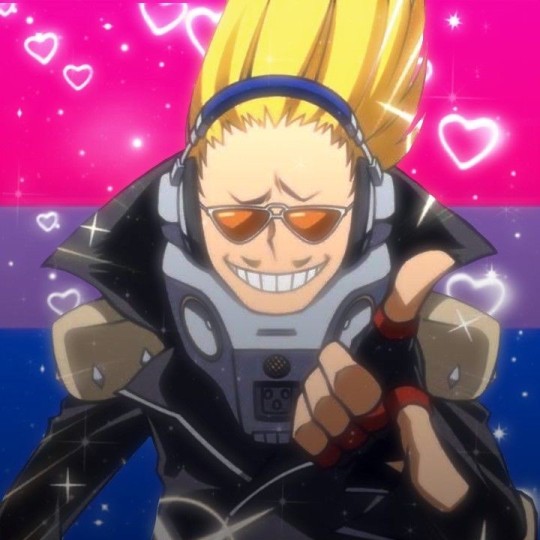
First, Just Some Tidbits You Can Add To Fics
Midnight's persona is so ingrained in her that she forgot and didn't think of how that would affect her students or how they would feel about it
The class is super close and trauma bonded. They find comfort in each other after nightmares, they help each other with panic attacks, with flashbacks, etc. Aizawa lets them break the not staying in each other's dorms rule bc of it
Dadzawa offers his capture weapon to comfort his kids/students like a weighted blanket
Where Aizawa was a vigilante before he got into the hero course
Dadzawa sees the Three Dumbingos in Midoriya, Bakugou, and Todoroki or Kaminari, Sero, and Kirishima or a combination of the two lol
Quirk accidents are a common occurrence, especially In stressful or highly emotional situations. Regardless of age, though probably more common in children
Roki has a slight phobia of fire
Midoriya Hisashi as a good dad bc their isn't enough fics with it that way
A Whole Lotta Smallish Fic Prompts
Villain/Vigilante EraserMic(Cloud?) ‘adopting’ a bunch of kiddos that need homes. And creating an army against the HPSC. They'll be like the mob lol
MHA group home AU ran by you guessed it EraserMic or by Nezu and they're just caretakers
Todoroki Shouto gets OFA and is mentored by Good!All Might. It's mostly to piss off his sperm-donor but also because he is a secret AM fanboy
Sentient quirks, whether that's expanding on Tokoyami and Dark Shadow or giving someone else a sentient quirk too
Jirou knows about OFA. She overheard the knowledge of All Might's no might form and OFA, his quirk, with her own quirk. Not purposely ofc
Mido with a pyrokinesis quirk! Which has been done before but not enough! Mido's kinda a pyromaniac... Was he born with it? Did it manifest when he was four? Did it manifest much later and he was thought to be quirkless?
Sero with a cartoon physics quirk. Vigilante. Named Toons? He also listens to some tunes on patrol lol I think he'd love puns ngl. Pranks, an ungodly amount of pranks. So bad endeawhore will be sobbing in the aftermath. SeroRoki besties.
Chisaki Izuku. Mido as Chisaki Kai’s younger brother. Has an Activation and Deactivation quirk (Superpower wiki for more info). Anything he touches that can turn on and off he can turn them on and off, quirks to bodily functions (kinda the same thing I think lol) to technology. He defies Overhaul at every turn bc of Eri. He escapes with Eri and is found by Aizawa. Dadzawa, PapaMic
Shirakumo Oboro is reincarnated into one Toogata Mirio. Shirakumo Oboro died on July 15th (I think he died around this time but the timeline isn't that clear) and on the same day Toogata Mirio was born. Okay, but if I remember correctly Shirakumo was made to give Aizawa a friend like Mirio is to Amajiki. So, like it's literally perfect lol– ah! But the ages, he died 13/14 years ago and Mirio is like 18. Sooo???
Someone give Sero, our resident tape dispenser, OFA, so he can have Danger Spidey Sense. Ig there's Black Whip too, which would help with mobility. A bit like Spider-Man’s Iron Spider Armor/Suit. Sero would be living his little Spider-Man fanboy dream!
Hatsume Mei being Nezu's only personal student. The chaos– the shenanigans, the hijinks they would get into! This could just be pure crack but I think some of you could put a serious spin on this.
MHA/Soul Eater crossover. Think more MHA and heroes than Soul Eater or finding a way to mesh the lore well enough
Aizawa infiltrates the LOV and redeems them
More class B and Shiketsu fics
Shiketsu AU. Quirkless Midoriya accepted? Monoma will be there and his class B is better shtick, now Shiketsu is better shtick. Shinsou there too?? Camie helps them find their class on the first day
Jirou as MC with medical training and a quirk called Body Manipulation (look on Superpower wiki for more info). Vigilante armed with a Monster High metal bat (I think Jirou, Mina, and Toga would love Monster High). Operator is her vigilante name. Fellow vigilante and partner in crime Toga Himiko. Toga has a blood portal quirk. Vigilante name Transfusion. The two act as paramedics for an underground hospital. Future Proteges of Recovery Girl. And it's pride month so maybe you can do a rare pair with those two, Jirou/Toga
Aizawa is practically adopted by the Midoriyas! All the Midoriyas either see him at the park, cat cafe, or they share the same train sometimes. Quirkless Midoriya Izuku or he helps him with OFA. Aizawa teaches Bakugou how to control his anger and that quirkless doesn't mean useless. So, no bullying! Pining EraserMic! Aizawa kinda becomes like the Midoriya adults’ younger brother while he's like an uncle to the youngest
Twice-Centric fic. Twice is Mic's CI (and friend) who infiltrates the LOV for him
Technomancer. Mido has a technopathy and mental continuation quirk (again Superpower wiki). Mido commits sewerslide and gets this quirk (they are mixed into one). He is a tech/electro ghost, he's kinda like an AI. Now he helps different heroes especially his favorites like Eraserhead and Present Mic. But also his favorite vigilante Kaminari?? Tokoyami?? Tokage?? Roki??? His hero and vigilante name is Technomancer. Takes over the HPSC?? Nezu is intrigued by him immediately ofc. Our beloved Power Loader loves him. Absolutely loves him they work on support gear projects together. Hatsume and Power Loader can make him a robot body to possess basically!!!
Oh, How The Tables Have Turned (and how you have turned on each other): This AU(?) is lots of world building fun. A fic about how the quirked were first oppressed heavily by the quirkless and how the roles swapped. How there still is quirk discrimination but now it's more the quirked against each other than another oppressor. How quirks are everything in society now.
A Couple Quirk Ideas
Add Insult To Injury. Insult Empowerment. The quirk allows the user to get stronger when insulted. Talk shit, get hit
True Self Recognition Quirk (again Superpower wiki for both)
One Big One For The Road (Midoriya Tears™ is a quirk)
Midoriya can manipulate them from the volume to the strength to where they go. He needs to drink lots of water and will get dehydrated with quirk overuse
Mido thought he was quirkless because his mom has a secondary passive quirk that's very similar to him. That many other family members have possessed. Hence the Midoriya Tears term. And maybe he is a false negative for quirklessness
BUT HOW DID NOBODY ACCOUNT FOR IT BEING A QUIRK?!! I'LL TELL YOU–!!
–because everyone heard quirkless and that's all they paid attention to. Also the Midoriya Tears are very much a reoccurring trait with various power levels. The person who originally had the quirk was from ages ago– maybe at the dawn of quirks? And it steadily appeared or didn't and was still passed on to the next regardless.
Obviously our Mido’s quirk is the strongest version yet bc MC privilege lmao. And no one knew bc he obviously never trained it. Why would he when he thinks he's quirkless? And it's just a ‘Midoriya thing’. ALSO plot armor lol
Maybe Bakugou guesses but everyone is like, 'your delusional.' and then he's like, ‘Deku is still delusional even if he has a quirk!’?
Or good Bakugou from the start who is driven crazy trying to convince his best friend he has a quirk while scaring his bullies away as he tries to get him to stand up for himself too??
In this fic please give Sero, our beloved tape dispenser, OFA, so he can live his truth and have his little Spider-Man fanboy dream!
🏳️🌈🏳️⚧️
#not my art#i like these#these are fun#fanfics#mha#fanfiction#fic prompts#fanfic writing#fanfic#bnha#writing#aizawa shouta#izuku midoriya#present mic#jirou kyouka#all might#todoroki shouto#sero hanta#kaminari denki#shinsou hitoshi#bakugou katsuki#midoriya izuku#hatsume mei#the big three#eri#kouta izumi#the 100#soul eater#au#crossovers
33 notes
·
View notes
Note
Question: So, if Miguel knows spider!reader in Arachnophilia, and spider!mig is mentioned in AFM, does reader know her own spider variant (personally or from Miguel/other spiders mentioning them) ??
I love both stories, and obvi the idea of Miguel & Reader being tied in several universes, but I was just curious on the idea of reader knowing.
oh im SO GLAD I get to talk about this THANK YOU SM cos its been on my mind for days!! I will use this chance to actually drop the dante fic cinematic universe timeline, which is: easing tensions - arachnophilia - a fortunate mistake - a fortunate mistake II There's certain things I gotta keep vague because I know how arachnophilia ends (and how it might tie into AFM II) and I don't want to spoil, but I'll talk about a bit because I'm rabid rn.
I wanna add for the sake of my lore on multiverse stuff, Miguel's who are turned into Spider-men are quite rare? I think this gets mentioned in AFM but Miguel's in general are rare, Spider Miguel's even more so. I took him saying Gabi's universe was the one where he was happy to heart, along with the fact we see zero variants of him in the society. That shit was always the most interesting thing to flesh out. I also don't know if I've ever talked about nena's multiverse story properly either, but its pretty tragic. She largely only exists in universes where Miguels' exist, and in all the ones where she comes into contact with him she dies. Our Miguel's universe is the only one where she doesn't, and Miguel blames this inititally on his canon but, as we know, canon isn't real, in reality it's because our Miguel was the only one with multi-verse experiences that humbled his apathy and violent tendencies. It's sort of like how meeting Miles put Peter B. on a better course, Peter's influence on Miguel is something no other Miguel had and it changed him in a way that made him capable of growing. Vig is the only other one we've met and it's obviously implied he was a poor partner who became a good dad after nena's death. Nena is like, universal collatoral damage, and it's only in the universe where she wasn't 'meant' to love him that she got to be loved. It's fucked up and she deserved better fr.
BUT I will say, to actually answer the question (sorry lol) the reader in arachnophilia is actually not a variant of the reader from AFM. I am sticking with the rule that AFM reader is never a spider, because its important later hehe.
BUT! But this makes Spider!Mig and readers relationship equally interesting to me anyway. I am a sucker for starcrossed lovers, excellent trope, and while it was meant to be a one-off I wanna use it to explore the idea of fully abandoning ones canon and exploring a relationship beyond the bounds of ones universe. I will be going more into Spider!Migs backstory for this, but I think the films never properly addressed the potential dangers/tragedy of love between people from different universes. I used it a bit with OG Miguel with my explanation for what happened with Gabi, E.g him trying to combine their universes, but this is especially spicy. So, again, actual question (I'm so sorry I swear this is all I think about, rip my PhD) as of AFM II reader also doesn't know about Miguel's variants beyond Vig, YET. Miguel is aware of Spider!Mig and reader as of AFM, and if you go back you can see a lot of his mindset in there, especially when he talks about not wanting kids because of his genetic mess and feeling like he's too dangerous.
Miguel as a character is great, I can't say that enough, he's harboring so much self loathing and unaddressed trauma that while he wants to do the right thing he imposes very strict rules that always end in hypocricy. In the same way I think he's awful to Miles because he see's Miles making the same mistake he did (e.g destroying the universe for a loved one) and a lot of his violence is like, imposed, he's awful to his variants because he knows he's fucked up his own moral compass and takes it out on them.
But yes Miguel knows where they are, he has not told reader though, but I do want to have them cross paths.
#im sorry this was so long#i truly am lost in the sauce#i keep wanting to do a big document just about the character differences between OG miguel and drider mig#because its fascinating#miguel is all i think abotu hes so INTERESTING#miguel o'hara x reader#miguel o'hara x you#miguel o'hara fanfiction#arachnophilia#a fortunate mistake
30 notes
·
View notes
Text

Sonic Youth - Mather Campus Center, Trinity College, Hartford, Connecticut, July 1, 1992
For our 1992 installment of the #SonicSummer, we're back in Connecticut and back with another killer tape unearthed from deep within the Alex Butterfield Archives. After several years of hard touring, Sonic Youth had actually taken a fair amount of time away from the stage in the first half of 1992. But they were back on the road on the riot trail come summer.
This Trinity College gig comes right before the band's legendary Independence Day double bill in Central Park with the Sun Ra Arkestra — and also right before the release of Dirty, which hit the compact disc racks a few weeks later. With Nevermind producer Butch Vig twiddling knobs, Dirty was perhaps Sonic Youth's biggest grab for a commercial breakthrough; the LP didn't exactly burn up the charts like Nirvana, but it certainly brought the group to a wider audience.
In Hartford, the band warms up with some old faves — "Teenage Riot," "Burning Spear" and "Dirty Boots" — before offering the crowd a big helping of the Dirty stuff. Some of it is a little shaky, with a false start on "Drunken Butterfly" being the main offender. But otherwise, the new tunes are rad: the majestic swells of "Theresa's Sound World," the glam-noize of "100%," the sleazoid crawl of "Swimsuit Issue" ... Interestingly, Lee Ranaldo doesn't sing at all throughout the show. Was he still licking his wounds after his awesome "Genetic" was wrongly relegated to b-side status? Maybe! (That tune would be a regular setlist inclusion later on in the year, though.)
The evening ends with a soaring "Expressway To Your Skull," a tune that the band would soon retire for a few years. But it still sounds so good, that molten feedback flowing into your ears. The meaning of feeling good ...
Bandcamp | Merch | Concert Chronology
11 notes
·
View notes
Note
flavour of the week is straightening out Adrian Chase’s glasses and kissin’ his bruises
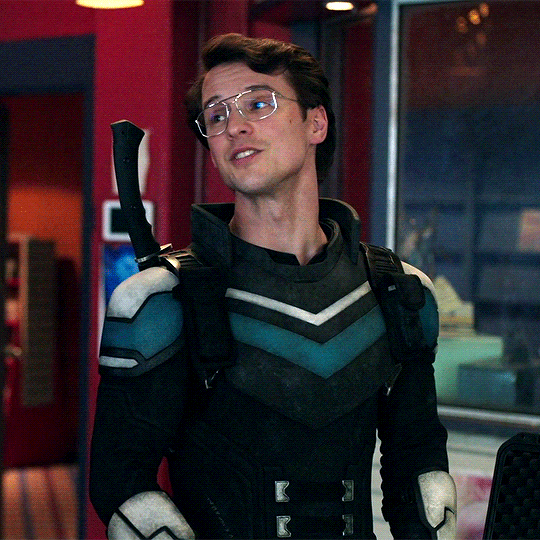
; NOW OR NEVER — VIGILANTE / READER
summary: you patch adrian up. feelings come to a head. adebayo just hopes you two don’t fuck on her desk, y’know?
pairing: adrian chase / f!reader (ex-hero)
rating: t for kisses and the usual vig characterizations
a/n: this beautiful gif has ocupied my brain for the last day — it’s from this loevly set by the @life-or-something-like-lt! anywho, who ordered ex-hero who stops crime fighting because of a horrible injury and mental health? it’s comin’ right up! pipin’ hawt! there’s lots of feelings in this one, so enjoy my first lil’ adrian piece. ;-)
“Vigilante.”
“I mean, who knew the human body had a whole gallon and a half of blood in it! Seriously, that’s, like, a whole jug of milk. But, blood—”
“Vig...”
“It’s cool, y’know, because the suit is machine washable. Isn’t that great? The only shitty thing is that I definitely have blood in my boots and I can totally feel it between my toes right now—”
“Adrian.”
His mouth snaps shut. Above you, you spy his eyes move down to inspect your expression. He has that look on his face — the one that’s half-proud and half-boyish. He presses his lips together and inhales through his nose.
You offer him a wry look.
Hardly punishment.
“Sorry,” he says as he leans back against the desk and lets you continue your work, “Right.”
He swallows down a smile.
You shift in your boots. His long legs are crossed at the ankle. He pops his arms across the chest of his suit.
“It would be one thing — look up — if I wasn’t trying to figure out if you had a broken jaw,” you say slowly as you move your fingers along the sharp contour of his face; you’re gentle, Adrian's eyes slip shut, “Does that hurt?”
You press lightly against the hinge of his jaw. Even through the light, mint-colored gloves, you can feel the warmth of his skin. He shakes his head despite a minute wince.
“Sorta sore?”
“Definitely to be expected when you face plant off a third-story balcony...” you mutter matter-of-fact.
“I have no idea what you’re talking about—”
“Don’t even try. I saw the footage,” you jab playfully with a rare smile — it cracks through your usual stoic expression like the sun on a cloudy day, and Adrian swears it’s the prettiest thing in the world.
He’s distracted.
His reply is a moment late.
“...Wait — who the fuck showed you that?”
“I did,” comes the voice of Leota — she has her bag slung over her shoulder as she exits Murn’s dim office and slides the two of you a look, “Gotta keep you humble, Vig.”
“Seriously?” he nearly whines, brows tightening. You lean away with a little laugh, gathering up a cotton swab and some rubbing alcohol. Over your shoulder, you catch Leota toss up a loving middle finger towards the man posed at your make-shift medical station.
He tosses it back, but even his pout is laced with affection.
You laugh quietly to yourself.
You like this team.
It’s been a long time since you’ve been on a team.
You followed Leota here from Gotham — promising help to one of your oldest and best friends. As a forcibly retired B-list vigilante, you earned yourself enough trust with Murn’s team to find a spot on the roster.
Apparently, Economos was a fan. Adrian, too.
She’s only the coolest fucker to ever grace the ranks of the Justice League. Have you seen her iconic fight with Poison Ivy in the Gotham Commons back in 2019? Seriously, guys, Adrian had griped to the team’s push back, Old news. We’re Whisper stans in this house.
...It was nice.
...Sweet, even.
“It was graceful, at least,” you say slowly as you look back up at Adrian. The bridge of his nose is split where his trademarked visor dug into his skin. There’s a black eye starting, “Not the landing, though. That was—”
“Face down ass up, dude.”
You snort at Leota’s comment.
“Are you leaving?” Adrian asks as he waves his hands in her direction, “Please tell me you’re leaving.”
It’s Adebayo’s turn to laugh. You muscle your smile down as you lean a hand on the table and wait for Adrian to stop squirming before you move your attention to his nose.
“Oh, yea, no — I’ll leave you two to it,” she waves as she pushes the door open. It’s late, and it’s raining, and the woman slips a look over her shoulder, “See you two tomorrow...?”
There’s an expectant edge in her voice.
Between Leota and the grave, she’d been watching the two of you through Murn’s office window and was totally seeing the way you two have been looking at one another when the other isn’t looking. It’s gross. Cute-gross. Cutross. Grute.
...You know Leota is convinced something is going on between you and Adrian.
Truth be told, maybe there was.
But, that was between you and your thoughts — and the smiles that he somehow earned that no one else did.
“See you tomorrow, Le.”
She hesitates, looks at the two of you, then smiles. “Night, guys.”
“Night,” Vig offers – albeit it’s a bit of a grumble.
The door closes, and you turn your full attention back to Adrian Chase.
Handsome, handsome Adrian Chase.
You’ve wondered since you’ve met him if he knows. Is he aware that you think about him more than any other co-worker you’ve had, masked or not? Seriously, more than Bats. And Bats was Bats. Everyone had the hots for Bats. But, not like this. Not like how you have the hots for Vigilante. You.
Does he know you think he’s funny, even if his immaturity borders on all-encompassing? Does Adrian know you’re distracted now, standing this close and this alone?
You dab the cotton ball lightly against his nose.
He hisses.
“Sorry,” comes your quiet apology.
“S’okay,” he placates you. His eyes are screwed tight. You’re glad, really, because he has a habit of watching. It makes you feel things. A lot of things.
There’s quiet then. You’re slow when you pull a bandage from the first aid kit to place on the bridge of his nose. You assess the laceration, decide to gently dab a bit of antibacterial ointment on it, and peel open the white bandage.
“I can’t believe she showed you the video.”
You huff a little laugh out. “It was funny.”
He pries one eye open.
You’re smiling again.
The corners of Adrian’s mouth quirk. “Yea?”
“Yea,” you look down, and he opens both eyes. You gently pull the paper from the back of the dressing, “I, uh, I’ve had some falls like that before.”
His brows climb his face. “The Whisper? Has faceplanted? I refuse to believe that.”
You swat at his shoulder, but you’re smiling still. Even more so, a laugh is pried from your chest and Vig can’t help the surge of pride he feels at being able to conjure the sound. “Stop it — look at me? Thank you.”
Adrian’s lashes kiss his cheeks when you press the bandage neatly over the broken bridge of his nose. Your thumbs smooth the adhesive down along his cheeks — and he swears he’s not imagining the way you linger.
When he opens his eyes, you’re looking him over.
It feels like forever.
His chest burns.
He swallows thickly.
His voice is quiet when he finds your eyes. “...You okay?”
This time, it’s your reply that falters.
...Fuck, your heart feels like it’s on fire.
You blink at him, clear your throat, and crinkle the wrapper in your hand. “Y-Yea. Yea, I’m fine.”
“...Do I smell?”
“...What?”
“You’re looking at me like I smell.”
“...No, you... I don’t think you smell—?”
“I hope not,” he chatters, still maintaining dead-honest eye contact, “Because that would totally kill the mood.”
“The mood?” you press on, holding his gaze.
“Yea, you know — beautiful girl patching up my... totally bad-ass injuries from... like, saving the world and not falling off a balcony.”
Your smile stutters back alive. “Oh, right.”
“Right,” he chirps, “And I don’t even have my glasses on and I know you’re giving me that really pretty smile right now. The one you do when I start going on and on and on like this—”
Your heart stutters on the compliment. Then, your eyes widen in realization. “Oh.”
You ditch your gloves quickly and Adrian blinks. Fishing in your pocket with clean, bare hands, you then procure his glasses. Silver frames. A little big for his face.
“Here, let me,” you say as you flip open the glasses and hold them up to his face.
You’re careful to mind his nose.
Adrian swears this is, like... a fucking fever dream.
Does he have it this bad? That, like, you putting his glasses on for him has his heart hammering so hard he’s half-convinced he could pass out? Never mind the fact that he swears he’s two seconds from getting rock hard because you’re being gentle with him. Kind and sweet and gentle and doting and you’re the fucking Whisper.
You’re, like, famous.
A hero. A serious, real, retired hero.
Your fingers sit along the silver frame as you adjust his glasses against his face.
You step back to survey your work temporarily.
...Yep, just as beautiful as he thought.
Then, you come back into his orbit to adjust them.
...Fuck.
Fuck, fuck, fuck, fuckity fuckle fuck.
“There we go,” you breathe.
“Thanks.”
His voice is hoarse.
You notice.
"Anytime,” you say, half-here and half-there and completely focused on the way his green eyes are flicking across your face.
Now that he can really see, this whole thing is a thousand times more real.
Your hands are lingering on his glasses.
Then, they slip to his cheeks.
Your attention sticks to the bruise crawling around one of his eye sockets — it’s a nasty mess of purple and yellow. You hum. “Promise me you’ll ice this?”
“Worried about me, Whispy?” comes his chirped reply, despite it being soft and earnest.
Another smile. Slow, but bright. It isn’t an answer, but it is enough.
It’s enough to send Adrian careening towards the cliff’s edge.
Suddenly, he’s blurting out:
“Can I kiss you?”
Your eyes widen enough that Adrian can see your pupils dilate. The swivel of interest in your eyes stokes some confidence in him; after all, he can’t help but feel a little out of his league here. But, you are here. Touching him.
When you nod, it takes everything in him not to crash his mouth against yours.
He gets close — and when your hands fall to his chest, he’s pushed back slightly.
“Gently,” you remind, your lips centimeters from his, “Your nose.”
Oh, fuck his nose.
Ow, ow, ow — never mind, gentle is good. Gentle... Gentle.
....Gentle.
Gentle is nice.
Gentle is slow and soft and hands on his chest as his arms snake around your waist and tug you closer. Gentle is chest to chest, fingers crawling up his armor, with your lips against his. Tentative. Lovely. Gentle is a hitch of your breath that exists in the momentary break of the kiss. Gentle is Adrian’s nose to your cheek as you lean up into him.
Gentle is a month of tension easing into a simmer — and gentle tastes like honey tea. His gentle tastes like cinnamon gum.
“God, you’re so pretty. Seriously, you’re the most beautiful girl I’ve ever seen, ever, and you’re so nice—”
“Adrian.”
His whisper is spoken against your mouth. His glasses nudge your cheek. You smile into another slow and heady flow of kisses.
“Stop talking and just kiss me.”
“Right.”
#god this is so fucking cute#don't look at me#adrian chase x reader#adrian chase x you#adrian chase imagine#vigilante x reader#vigilante x you#vigilante x y/n#adrian chase x y/n#peacemaker imagine#peacermaker spoilers#peacermaker hbo#dc imagine#adrian chase x female reader#vigilante x female reader#now or never
4K notes
·
View notes
Text
Cloud’s Top 5 MHA Vigilantes Chapters
In order to commemorate the ending of Vigilantes tomorrow I have come up with a list of my top 5 favorite chapters! I found it really hard to narrow it down to my favorite individual chapters because when I think of Vig, I think of the overall story and the arcs rather than the chapters by themselves. Nonetheless, I have attempted to compile my favorites here! Spoilers also!!!!
5. Chapter 1 - “I’m here.”
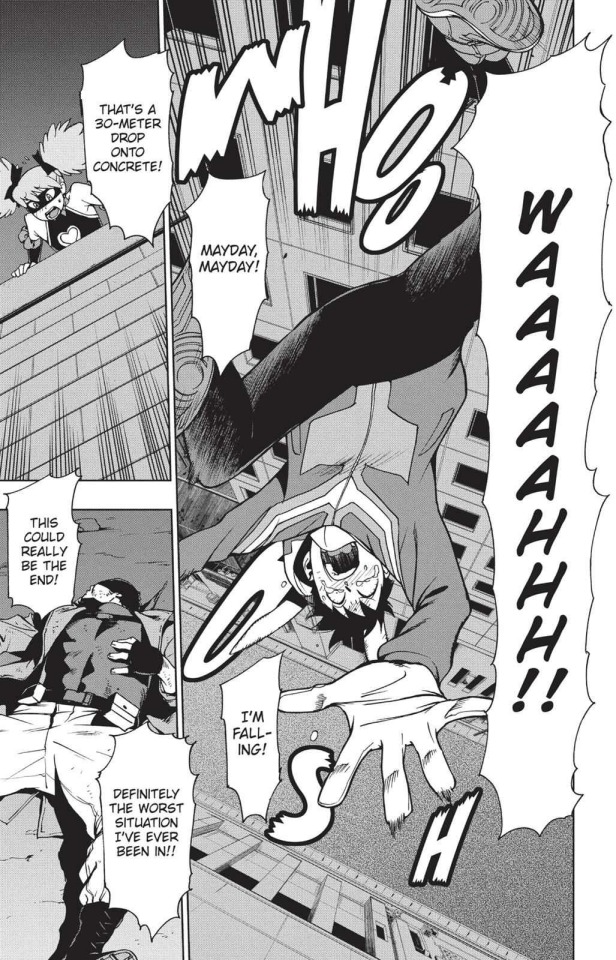
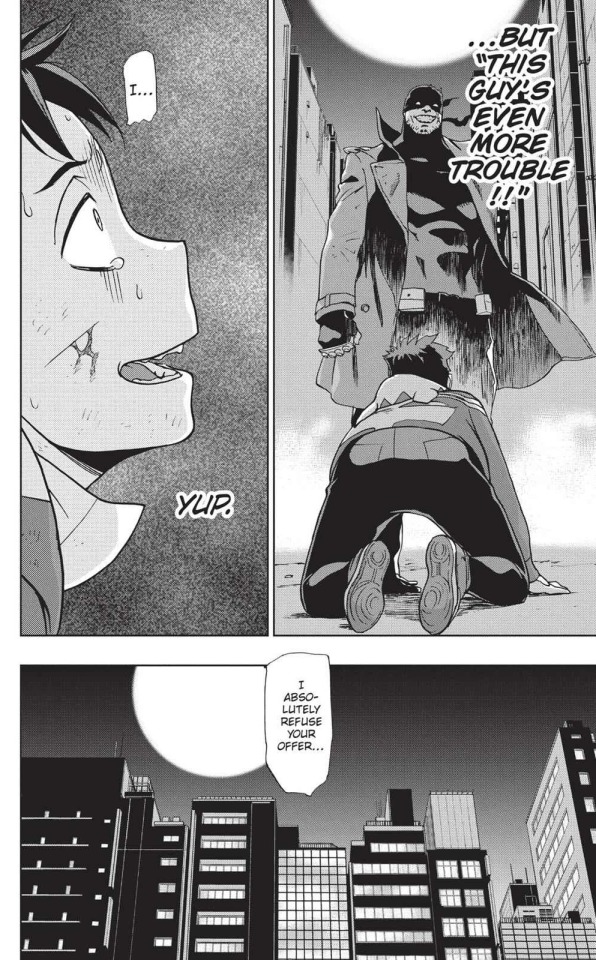
Yep! Had to put the very first chapter on this list for two main reasons. The first is because it works very well as an introduction to the Vigilantes series. It quickly explains the premise of our story and introduces us to our main characters, while also showing how it differs from mainline MHA by diving straight into the darker themes.
The second reason is because this first chapter IS the whole of the vigilantes series because of how everything ties back to it. The line of “Well, All Might ain’t coming, but l’m here!” is the central theme of Vigilantes. “We can’t expect anyone to come to save us, so we’ll be here to do what we can.” is exemplified by the recurring use of “I’m here!”. So, when our characters say it, it always ties us back to this first chapter and usage. Then there’s other stuff like Koichi remarking on the qualities of what makes a good hero, all of which are boxes he himself has checked off by the end of the series, and the fact that Koichi’s first words to Pop are “Hey it’s the cops!”
True romance right there.
4. Chapters 106/107 - “Tag” & “The Days to Come”
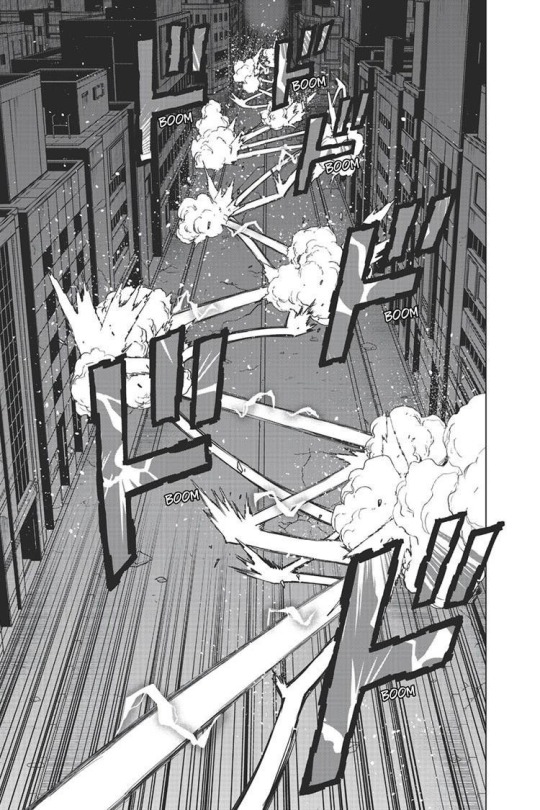
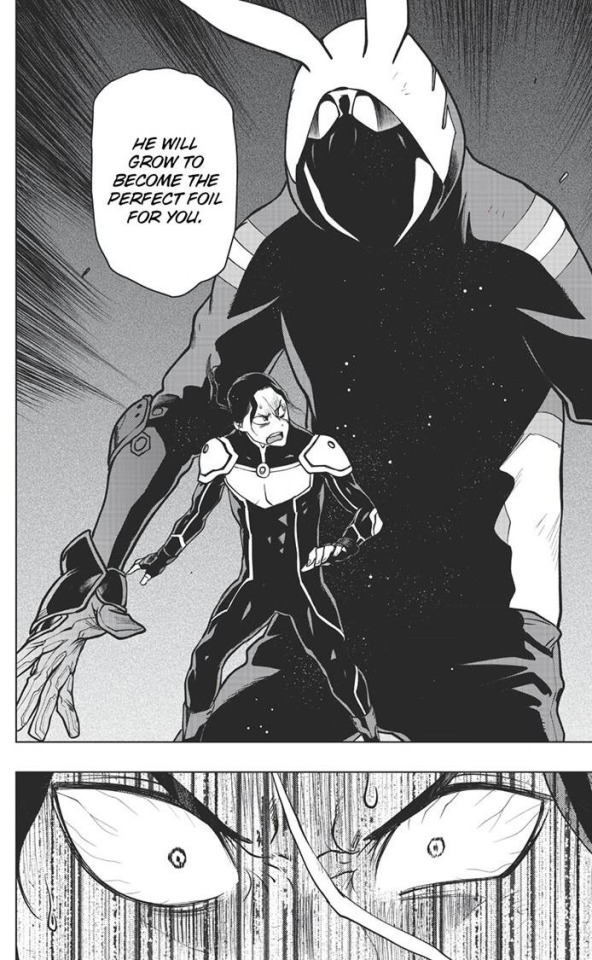
But Cloud! I thought this was just supposed to be your top 5, You can’t group two chapters together!
Shhhh It’s my list I get to make the rules
The reason I have both of these chapters ranked together at number 4 is simply because they contain my two favorite panels of the entire series. The first is from chapter 106 and is the my favorite example of Koichi and 6’s pure SPEED. They are so fast you can’t even SEE THEM, only the path they traced as 6 tries to hit Koichi with one of his explosions. The second is from chapter 107 and is part of AFO’clock’s warning to 6 about how if this keeps up Koichi will grow to overcome him. Which is paid off in the later chapters when Koichi goes on the offensive and develops Knuckle-style. Just the imagery here of Koichi towering over him and 6’s face are my favorite parts about this one. All the praise to Betten for these chapters.
3. Chapter 64 - “Shouta”
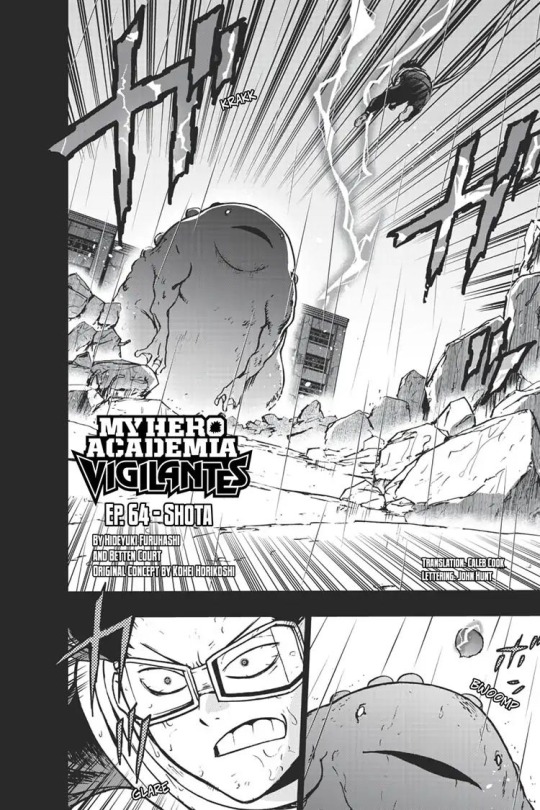
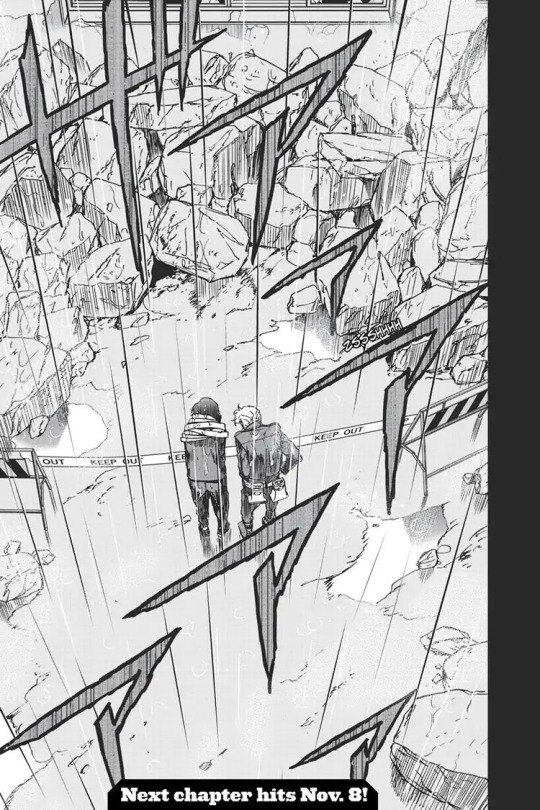
Everybody knows that this chapter is utterly soul-crushing, so I don’t need to say that, but this chapter is the reason I read all of Vigilantes in the first place.
Furuhashi has the audacity to give us hope, to make us believe that Aizawa won and that Shirakumo is going to be okay, only to RIP IT AWAY in the most painful way possible. Its that kind of storytelling that drew me in and and kept me invested in Vigilantes. That AUDACITY to do whatever they wanted with the plot is what sets vigilantes apart for me.
This chapter also sets up the idea for later chapters that you can hallucinate your loved ones giving you encouragement if you are a) fighting for your life and b) they are on the brink of death themselves.
This is only one example of Furuhashi being a master of set-up and pay-off.
2. Chapter 116 - “In Darkness”
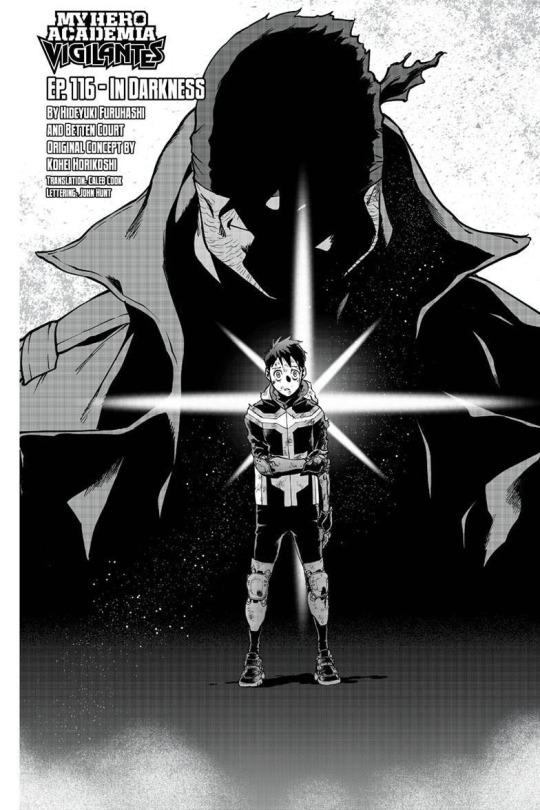
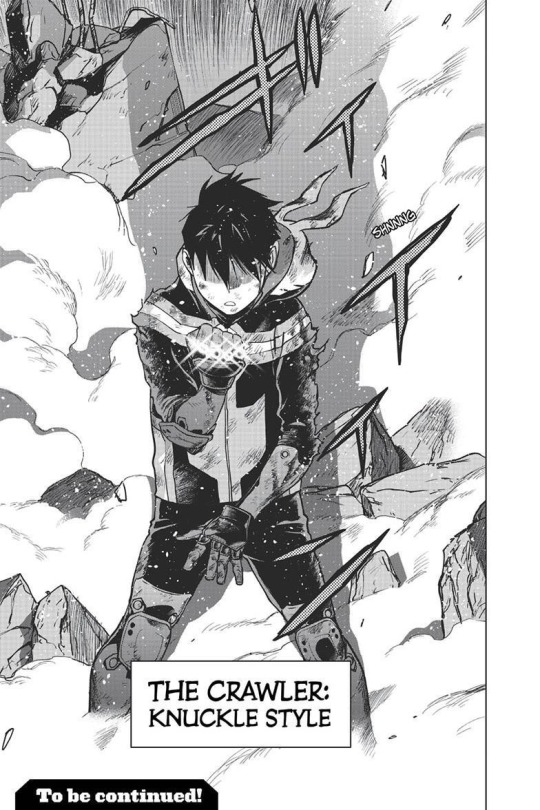
Okay now we’re just getting to the ones that make me cry. In 116 Koichi is on his last legs, he thinks he’s literally dying the whole time and it’s just a chapter of dialogue between him and Knuckleduster. The only real function of this chapter is to serve as a rallying cry for Koichi to get back into the fight, but the way it’s done is so understated and gentle.
Essentially this whole chapter is Knuckle telling Koichi “you don’t need me anymore, you can do this on your own” which is IMMENSELY PAINFUL for two reasons. One, while Koichi is on his last breath Knuckleduster is also dying at the same time, so we can see this as the their “spirts” reaching out to each other one last time before one of them dies. Or if you don’t believe that Knuckle is actually talking to him, it’s Koichi just imagining the image of his master and telling himself the things that he already knows. That he is capable, that he’s been a hero all this time, and that Knuckleduster would be proud of him.
And when he stands up at the end of the chapter, fully focused with his knuckles glowing with energy? Chills, every time.
1. Chapter 75 - “Letter”
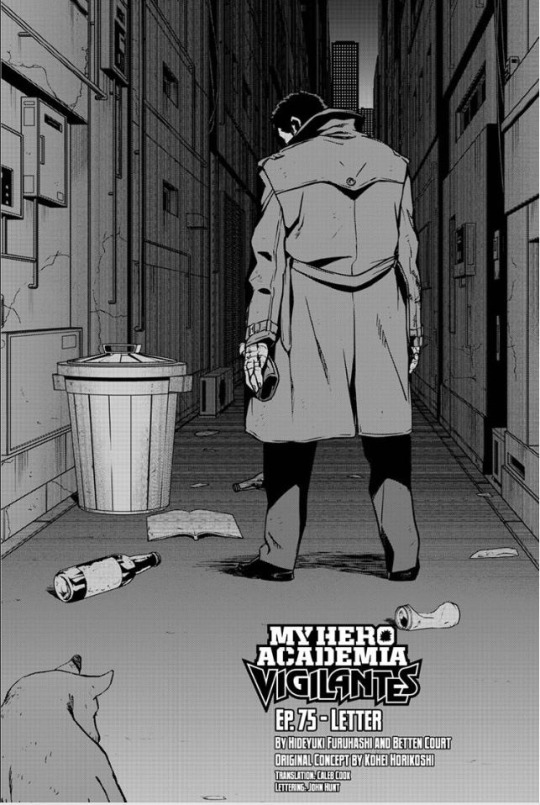
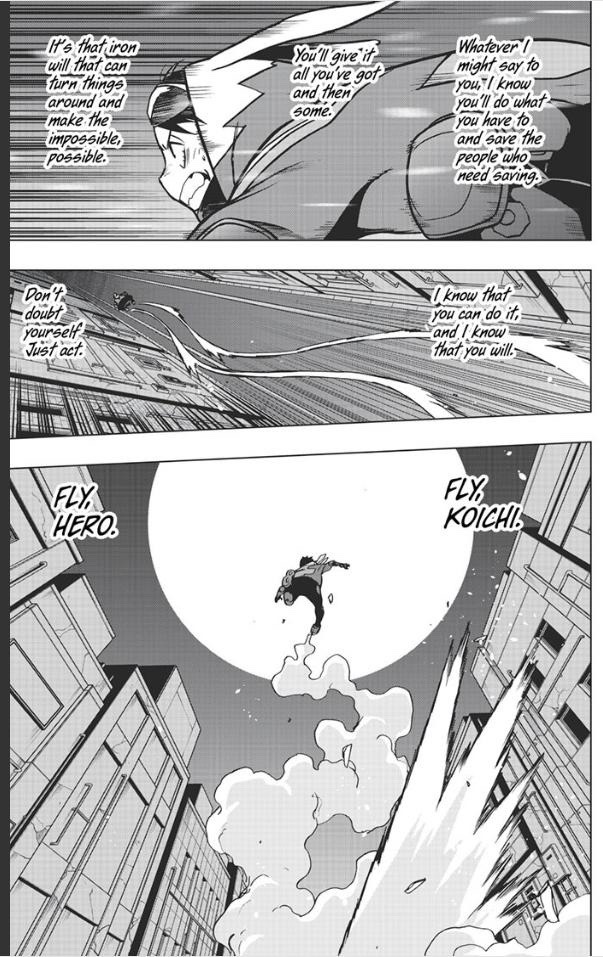
This is the one that can get me to cry literally every time I read it.
This, like chapter 116 is just Knuckleduster talking to Koichi, but this is his confession to Koichi. He starts off the letter by apologizing to him and then moves on to explain what he thinks a true hero is, only for him to say that Koichi has been his hero the whole time.
The notion that Koichi, this nobody, this guy on the street, with a funny quirk, and a penchant for being absent-minded, has always been a true hero is awesome. He showed what a true hero was to a Pro Hero, someone who had been doing “hero work” for years, but when Koichi hands Knuckleduster a tissue for his bloody nose all the pomp and circumstance that makes a hero in this world falls away.
It doesn’t matter about his quirk. It’s doesn’t matter that he’s tried and failed at being the hero before. It just matters that Koichi has the iron will to make the impossible, possible, and that when there’s someone out there, waiting to be saved, there isn’t even a decision to be made.
More than anything else, Koichi wanted to help people, and did whatever that entailed. That’s what makes him a true hero.
#ohhhhhh boy this is#long post#this ran away from me i love this series#mha vigilantes#mhav#bnha vigilantes#mha#bnha#everyone go read vigilantes challenge#koichi haimawari#mha vigilantes spoilers#bnha vigilantes spoilers#welovecloud meta#welovecloud rants#welovecloud
51 notes
·
View notes
Text

-An XA3J-1 at North American's factory during roll-out. Photo: North American Aviation
FLIGHTLINE: 152 - NORTH AMERICAN AVIATION A-5 VIGILANTE
Designed as a carrier-based supersonic bomber in the 1950s, the Vigilante saw service over Vietnam as a recon plane before being retired in 1979.
Development of what became the A-5 began in 1954 when North American Aviation started a internal program. Seeking to turn around the company's fortunes after the failed XA2J Super Savage, NAA began designing a Mach 2 capable bomber which would give the Navy a nuclear strike option. The initial design, known as the North American General Purpose Attack Weapon (NAGPAW) was evaluated by the US Navy, which replied with a series of needed changes and in July 1955 an initial design contract was awarded, which included a single mockup of the plane. NAA's engineers were able to successfully address the USN's concerns about the design, and in September 1956 a contract for two flying prototypes was signed.

-Orthograph of the A-5 Vigilante. | Illustration: aviastar
DESIGN
The plane, designated XA3J-1, was one of the largest and by far the most complex aircraft to be proposed to operate from a USN aircraft carrier. It had a high-mounted swept wing with a boundary-layer control system (blown flaps) to improve low-speed lift. There were no ailerons, roll control was provided by spoilers in conjunction with differential deflection of the all-moving tail surfaces. Power was provided by two widely spaced General Electric J79 turbojet engines (also used on the Convair B-58 and McDonnell Douglas F-4 Phantom II), fed by variable intake ramps. A single large all-moving vertical stabilizer was paired with the all-moving horizontal stabilizers. In order to save space, the wings, tail and radome were all folding. The XA3J had a crew of two seated in tandem, a pilot and a bombardier-navigator (BN) (reconnaissance/attack navigator (RAN) on later reconnaissance versions), who had some of the most advanced equipment of the time, including an early fly-by-wire system (with electromechanical backup), a primitive HUD system, a multi-mode, radar-equipped inertial navigation system, a TV camera in the nose, and a digital computer to run it all.
In order to make the bomber as streamlined as was possible, it was designed to carry additional fuel tanks and a single B27, B28 or B43 freefall nuclear bomb in internal weapons bay, which would be jettisoned over the target as a single "stores train". Provisions were also made to carry two B43 nukes or Mark 83 or Mark 84 conventional bombs on two external hardpoints, or drop tanks to increase range. Operationally however, these hardpoints were rarely used.

-Internal bomb bay and stores train of the North American A3J-1/A-5A Vigilante. | Illustration: Cobatfor
FLIGHT TESTING, INTRODUCTION, AND SERVICE
First flight of the XA3J was on 31 August 1958 from the same Columbus, OH plant that produced the F-86 and F-100s. Despite one of the prototypes crashing in 1959, the flight tests moved quickly, and by June 1961 the first A3J-1s entered service with Heavy Attack Squadron Three (VAH-3) at NAS Stanford, FL, replacing the Douglas A3D Skywarrior. The following year the plane was redesignated the A-5A under the new tri-service plan. The service life of the A-5A was fraught with issues, with numerous teething problems plaguing its advanced systems. These issues were tamed as maintenance crews became experienced with the Vig's high-tech gadgets, but the plane remained maintenance-intensive (a so-called "hangar-queen") throughout its life. A chronic issue was the stores train bomb release, which had a nasty habit of releasing during catapult shots, resulting in at least one crash. During tests, the train also tended to draft along in the aircraft's slipstream, making accurate bombing (for 1950s/60s definitions of "accurate") difficult.

-Five A3J-1 Vigilantes of VAH-7 ("Peacemakers of the Fleet") on CVAN-65 USS Enterprise in 1962. | Photo: USN
Fifty-eight A-5A were completed (out of an order of 64 aircraft) when NAA switched to the upgraded A-5B model. The B model incorporated changes made in light of the Navy's requirement that the Vigilante be able to take off at max weight with zero wind over the carrier being rescinded. This change allowed North American to increase the bomber's weight, adding a dorsal hump to carry more fuel. Only 18 of the A-5B were completed before the US Navy, undergoing a shift in policy away from manned nuclear bombers, canceled the order.
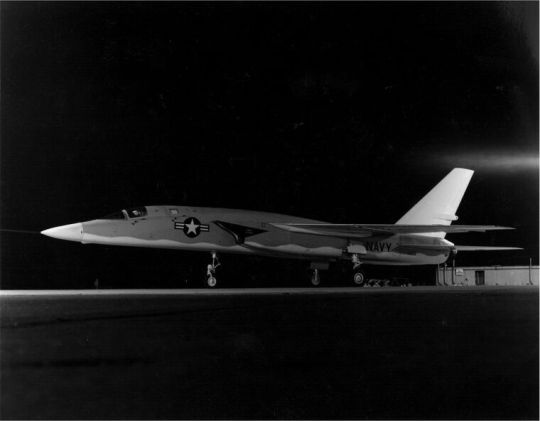
-North American A3J-2 Vigilante (BuNo 146699), circa 1960. This aircraft was the third production A3J-1 which was then modified to an A3J-2 (after 1962 A-5B and YA-5C) and finally to the A3J-3P (RA-5C). | Photo: US Navy
Developed from the A3J-2, the A3J-3P (later RA-5C) was a strike/reconnaissance variant of the Vigilante, incorporating the CCTV in the nose with a "canoe" fairing holding a full suite of gear including:
KA-51A/B forward-looking oblique angle film camera.
KA-50A, KA-51A, or KA-62A vertical film camera.
Passive electronics countermeasures (PECM) antenna for the AN/ALQ-61 Electronic Reconnaissance System. The AN/ALQ-61 was an "electronic intelligence (ELINT)" system that would pick up radar emissions and pin down their coordinates, frequency, and pulse pattern. The ELINT data was recorded on magnetic tape, with storage capacity for 112 minutes of continuous ELINT observations.
Various combinations of panoramic, vertical, or oblique film cameras. Camera fit included KA-58A panoramic camera for medium- to high-altitude work, or a KA-57A panoramic camera for low-altitude work. The cameras shot through prisms in the canoe that could be pivoted to permit shots straight down or from side to side.
AN/AAS-21 infrared sensor, which could provide a continuous film strip of thermal targets, such as hidden trucks, over a field of view 140 degrees wide.
Antenna for the Westinghouse AN/APD-7 "side looking airborne radar (SLAR)" system, which shot radar pulses out to the side of the aircraft and stored the return echo on a long film strip, permitting all-weather, day-night imaging.
Another PECM antenna for the AN/ALQ-21 system.
Additionally, a flash pod, powered by a ram-air turbine in its tail, could be carried under one wing to provide illumination for nighttime recon. The sensors were operated by the back-seater (also known as a "GIB": guy-in-back), formally called a "reconnaissance-attack navigator (RAN)". The bomb bay was filled with semi-permanent fuel tanks (though the plane apparently retained the ability to carry offensive weapons, this was never tested or confirmed). The remaining A-5A and A-5B aircraft were all converted to RA-5C standards, along with 33 new-build aircraft. Squadrons that had formerly flown the A-5 were transitioned to the RA-5 beginning with VAH-3 in July 1963, becoming Reconnaissance Attack Squadrons (RVAH) as they did so. Eventually ten squadrons of RA-5s were established, with the NAS Stanford RVAH-3 being joined by carrier-based RVAH-1, RVAH-5, RVAH-6, RVAH-7, RVAH-9, RVAH-11, RVAH-12, RVAH-13 and RVAH-14.

-RA-5C Vigilante of Reconnaissance Heavy Attack Squadron 3 (RVAH-3) "Sea Dragons" is parked on the flight line at Naval Air Station Sanford, Florida, on 27 March 1968. - | Photo: US Navy
Starting in July 1964, the RA-5Cs saw extensive service over Vietnam, carrying out dangerous post-strike damage assessment missions. Although fast and nimble, the Vig proved vulnerable to ground fire, with 14 RA-5s lost to AAA, 3 to SAMs and one shot down by a NVA MiG-21. Nine more were lost to accidents, and as a result three dozen additional aircraft were built between 1968 and 1970. Despite providing invaluable reconnaissance data, the RA-5 began to be phased out starting in 1968, with NAS Stanford being closed and the Vigilante's parent wing, Reconnaissance Attack Wing One, being transferred to Turner AFB in Georgia, which was turned over to the Navy and renamed NAS Albany. Barely six years later, NAS Albany was closed as a result of post-Vietnam drawdowns, and the remaining RA-5s were transferred again to NAS Key West. As newer and larger aircraft like the F-14 and S-3 were introduced in the mid-70s, the Navy began disestablishment of the RA-5 squadrons, with the last leaving Key West on 20 November 1979.
NASA, THE RAAF, AND THE USAF
At least one A3J-1 was bailed to NASA for a time while the Dryden FRC was participating in research for the US SST program. In 1962 Vigilante BuNo 147858 was given NASA tail number 858 and was flown by NASA pilot Bill Dana on 21 flights along airways around LAX to determine approach conditions for an SST landing patterns. After the conclusion of the program, the plane was returned to the Navy.

-NASA's A3J-1, wearing a day-glo orange tail flash, on 19 December 1962. | Photo: NASA DFRC
The RAAF was interested in the A-5 as a possible replacement for their aging Canberra bombers, considering the Vig alongside the F-4, Dassault Mirage IVA, BAC TSR-2 and F-111. Despite the A-5 being available without the delay anticipated for the F-111, the order for three dozen Vigilantes was not issued.
At some point in the Vigilante's development, North American advanced a proposal to the Air Force for the 'Retaliator', an A-5 with a liquid rocket added to the bomb bay, as an interceptor, but the USAF showed no interest. In 1972 NAA again proposed a modified A-5, known internally as the NR-349, to the USAF as an Improved Manned Interceptor. The internal bomb bay was modified to house a third jet, and six AIM-54 Phoenix missiles would be carried under the fuselage. Again the USAF was uninterested.

-Scale model of the Improved Manned Interceptor concept, in USAF markings. | Model: NAA/Rockwell
SURVIVORS
By 2004, all of the surviving RA-5s that had been retired to AMARG had been either scrapped or preserved as museum aircraft. A limited number of aircraft were still in storage at NAWS China Lake for eventual use in weapons tests. Around a dozen aircraft have been retained in museums around the US, with only one A-5A on display at NAS Pax River in Maryland, the balance being RA-5s.

-BuNo 146697, the sole remaining A-5A, on display at Pax River. | Photo: Richard Lane
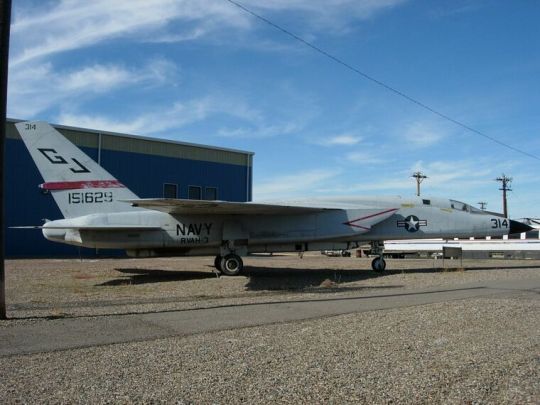
-RA-5C Vigilante (BuNo 151629) on display at the Pueblo Weisbrod Aircraft Museum. It wears the markings of the fleet replacement squadron RVAH-3 Sea Dragons. | Photo: Kristian Jones
#aircraft#aviation#avgeek#airplanes#cold war#airplane#cold war history#coldwar#aviation history#us navy#usn#north american aviation#north american a 5a#a3j-1 Vigilante#a-5a Vigilante#a5a Vigilante#a 5a Vigilante#ra5c Vigilante#ra5c
42 notes
·
View notes
Text
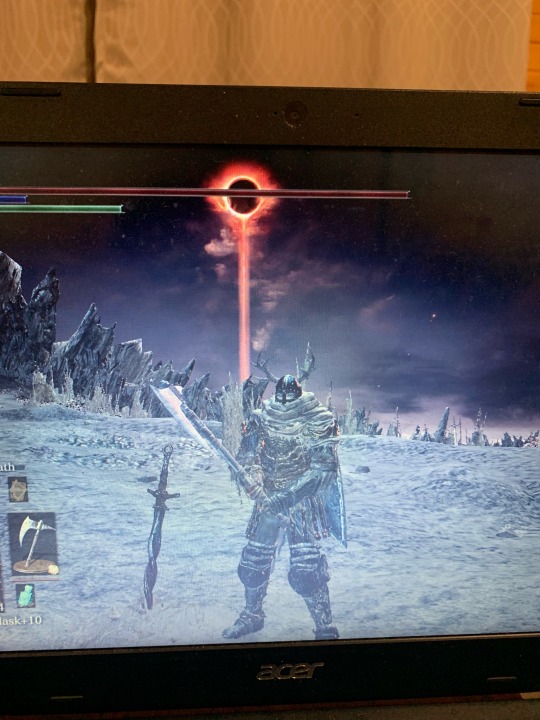


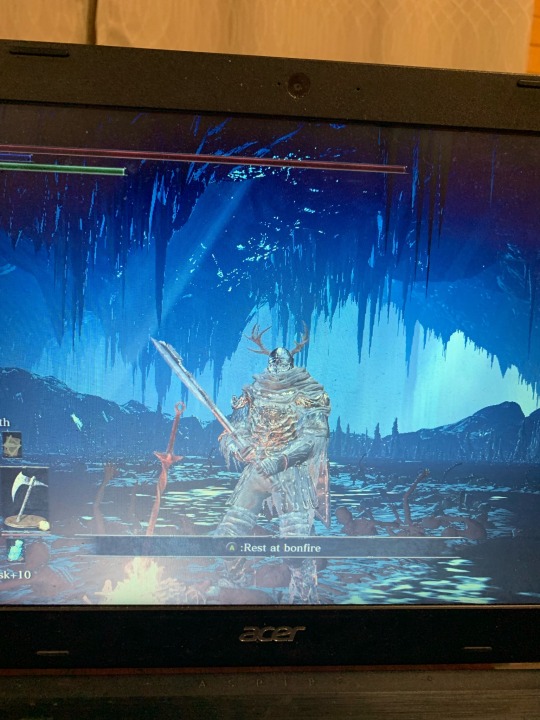
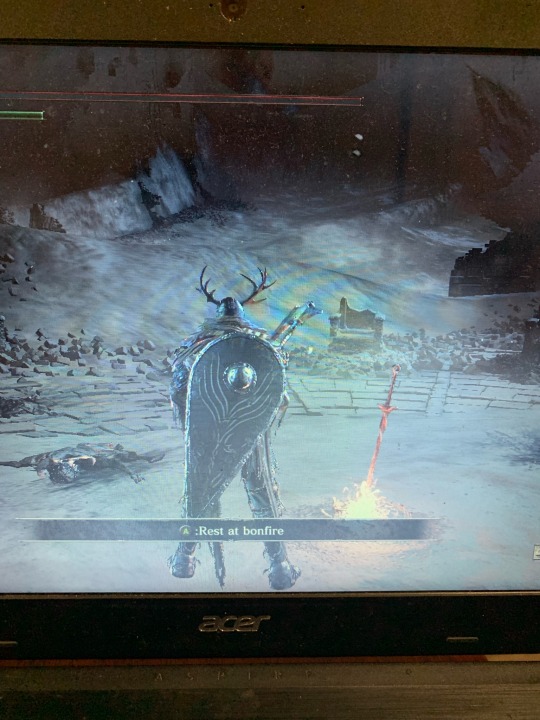
finally beat all the ds3 bosses solo the other day so here’s a buncha shitty cell phone pics i sent to my friend to brag
build was a regen faith build 44/40 VIG/END, 28/16 STR/DEX, 60 FAITH. rings were Sun Princess, FAP, Havel, and Chloranthy (all +3 for Midir/Gael). i used Blessed Lothric Knight Greatsword for Soul of Cinder, with Ancient Dragon Greatshield offhand, Sunlight Straight Sword + ADGS vs Nameless King, and the Blessed Dragonslayer Axe/Ethereal Oak Shield you see in the pics vs everyone else.
here’s my review of the 5 hardest bosses:
1. Soul of Cinder: 9/10
fun fight, the super varied movesets were really thematic. loses a point cos if you aren’t familiar with previous games’ lore this is kind of an “okay i guess there had to be a final boss” type of fight. like great gameplay but Cindy has 0 story build-up in ds3
2. Nameless King: -100/10 first phase, 7/10 second phase
overhyped garbage fight. hate playing camera souls phase 1, hate that you’re encouraged to bring lightning for the drake’s weakness and then punished for it phase 2, and i hate his janky stab-grab hitbox.
“he’s got a super varied moveset” okay but he doesn’t if you do the typical “suck dick and smack booty” ds3 boss strategy; the fight is just swing swing punish for 2 minutes straight. don’t get me wrong i love ds3 gameplay and i’m here for that but the way ppl talk about NK i was expecting something better than a trashfire phase 1 followed by a phase 2 that is IMO subpar when compared to Dragonslayer Armor or Cindy for “big dude with sword” fights.
i won’t be fighting NK on any NG+s i think. phase 1 is that unfun, so it’s probably a 1/character fight to get his sick fashion and maybe that swordspear
3. Sister Friede: 9/10
first phase is fun as hell once you get the hang of it, phase 2 is a bit meh and really why she isn’t 10/10, phase 3 is terrifying and so satisfying to beat. not much to say here. Friede and Cindy are both very nearly that platonic dark souls ideal of a boss that feels impossibly hard until you learn their moves and realize how fair (yet challenging) the fight is.
4. Midir: 10/10 potential, 7/10 practical
i love midir’s moveset and he’s the dragon fight of my dreams. you know how a lot of video games do dragon fights but they don’t do a good job of actually showcasing what it’s like to fight a five-storey tall crocodile that can breathe fire and fly? midir falls (omg spoiler) a lil short on the flying department but nails everything else.
the thing is, he’s a health sponge. this’d be my favourite fight in the game if he had about 2000 less HP but as is, he’s a bit too much of an endurance fight. which takes away from the sheer terror of a well done dragon - there should be more of an element of “take him down fast or die”. endurance fight removes that tension and makes it more of a “somersaulting arsehole teases animal for ten minutes before delivering a brutal headshot” kind of tone. midir also gives a surprising amount of space for you to heal for a battle that’s considered the hardest in the game, which removes the tension of an endurance fight - you’re not outlasting a series of deadly combos, you’re using your own massive HP pool to marathon 200 hits into midir’s noggin
5. Gael: 6/10
i’m probably never going to fight gael again but he does score a lot of points for
a) having each phase be more of an awe-inspiring “oh shit oh fuck” moment than the last
b) making me nearly piss myself when i passed through the fog gate for the first time and was like “huh this a weird spot for the gate” and then see him just fucking sprinting at me
c) literally saying “it’s always darkest before the soul!” like what a fucking funny line for the final boss of the series
anyways he’s got the same issue as midir where it’s a sastisfyingly difficult fight made frustratingly much harder by an inflated HP pool. even once i got phase 1 & 2 relatively down, he was such a slog that my mistakes would just pile up for phase 3. i know i don’t have this complaint for Friede who has a similar size HP pool but she’s not an endurance slog - she can get combo’d down fast phase 1, and phase 2 is so full of free hits that she’s effectively 5000 HP less than her written total. you don’t spend the entire fight dodging around being like “okay… where’s my one hit opening…” which is fun to do sometimes! just not for the entirety of an extremely long fight
outside of HP bloat, teleporting into phase 2 feels janky and basically having to use the pillars to create space for estus and buffs reduces an epic fight into cheesy videogame moments. i also literally did not realize that his cape hurts you because that makes no fucking sense. i thought he just had janky hit boxes until i looked up a video on how to beat him
fun as hell game overall tho time to finish my pyro, sorc, and ranger playthroughs
5 notes
·
View notes
Text
The Sátántangó Experience

How exactly does one prepare to watch a 7.5 hour film? A bit like what you might do in preparation for major surgery: Pack a bag of necessities (in this case, water and protein bars), kiss your loved ones goodbye, and try to make peace with your god. Or, maybe less dramatically, treat it as you would a long train journey, one that takes you through some harrowing terrain on half a rutted track before depositing you to your eventual destination.
Of course, this sort of conception of time is entirely relative: If you have to drive somewhere that takes half an hour, it feels unduly long; but if the trip were normally three hours long, and you somehow found a shortcut that would cut the time down to 30 minutes, you would be flying on dulcet wings for that amount of time, and think you were blessed by angels. In other words, spending an entire standard work day watching one film might seem excessive, but it all has to do with your expectations.
In my case, I was at Philadelphia’s newly renovated Lightbox Theater at the University of the Arts to take in Béla Tarr’s magnum opus Sátántangó, all glorious 450 minutes, in a new 4K restoration (it’s currently playing at select theaters across the country). Armed with my snack survival kit, and safe in the knowledge that we would get intermissions at roughly 2.5 hour intervals, I settled in to watch what has been described as a masterpiece in cinephile circles, and currently resides at number 36 in the most recent Sight & Sound critics’ poll.
Tarr’s beyond-bleak film is broken up into 12 segments, each having to do with a failing farmer’s cooperative in Hungary during the last throes of communism in the late ‘80s. Each section has its own feel and perspective — some of them are more lighthearted, others are desolate beyond measure — but all expertly shot in low-contrast black and white (by Gábor Medvigy), which renders the people and landscape in various tones of drudgery grey.
It originally opened in America as part of the 1994 New York film festival, at a time when Hungary was undergoing a transformation from Communism to shaky democratic capitalism, so it served as a kind of epigraph to the era, a showcase, as it were, as to the imperfections of a political system built on a promise of human egalitarianism that proved to be depressingly difficult to put into practice.
The landscape makes up a lot of Tarr’s vision, the flat, moody farmland upon which the collective has been toiling, and the unceasing rain and wind that constantly pelts the characters as they venture outside for one business or another. As the film opens, the collective — made up of three couples; a curious “doctor” (Peter Berling), who spends his time spying on the others, making copious notes in his stacks of file folders, and daily drinking his considerable body weight in Palinka (Hungarian plum brandy); and the cagey Futaki (Miklos Szekely B.), who has to walk with a cane from an unspecified accident, but seems a bit more shrewd than the others — is anxiously awaiting their annual wages, which come all at once and is meant to get divvied up amongst the members equally.
Early on, there are various halfcocked plans from individuals to try and steal the small fortune for themselves, reflected in much idle talk about meeting that evening and decamping for parts unknown, but that ultimately come to nothing. However, when word reaches the group that the mysterious Irimiás (Mihály Vig, also the film’s composer) is, in fact, not dead as they had been told, but alive, and returning to the collective he started, the group dynamic is thrown akimbo, with various members fretting for their future, and, one, the owner of the local bar (Zoltán Kamondi), furious at the thought his business will be taken from him.
Just why they respond like this remains vague. In ensuing segments, we see Irimiás, along with his associate, Petrina (Dr. Putyi Horvath), navigating through a police interview — where the local Captain informs them they will be working for him now in ways unspecified — though it appears the collective had very actively planned on not having to include their former leader (and his right-hand man) in their financial arrangements. As for the non-collective characters, including the aforementioned barkeep, and various prostitutes sitting idly around, the collective is virtually their only business, such as it is, so they, too, await this potential flood of cash eagerly.
As the segments begin to collect, they also begin to fold upon themselves: Scenes that we see from one vantage point in an earlier segment are revisited later on, from the perspective of a different character, enabling a thrilling moment of realization that the stream of time we’re following has breaks, jumps, and hiccoughs throughout. Never more poignantly than a moment with a young girl peering into a window of the bar — one of the only lit buildings in the otherwise dismally dark countryside — watching the adults inside drunkenly dancing and cavorting.
About that girl. Easily the most emotional moment of the film involves her, but not first without the audience paying a heavy price, depending on your empathy for other creatures. Before the film screened, during its introduction, we were made aware that there was a scene of animal cruelty involving a cat somewhere in the proceedings. The sympathetic presenter, himself a cat lover, suggested looking away for parts of that segment, though a friend of mine in attendance who had seen it before assured me looking away wasn’t really an option. Fortunately, he also told me that the cat in question wasn’t actually hurt, and was still alive at the time of a 2012 interview with Tarr.
Needless to say, my worry about this poor cat dominated my experience in the early going: Every time I saw a feline in the background of a scene, I worried that it was coming up, such that it was almost a relief when it finally happened. The situation is this: Estike (Erica Bók), the young daughter of one of the local prostitutes, caught up in her world of half-fantasies after being sent out of their apartment by her working mother, holes up in an attic with a grey tabby. At first, she pets and cuddles him, but eventually, she desires to control him, bend the cat to her will. To the cat’s increasing discomfort and fury, she grabs him by the front paws and rolls around with him, all the while muttering how she alone can determine its fate. Looping up the poor fellow in a net bag and hanging it from a post, she goes downstairs to mix a batch of milk with some rat poison powder and force feeds him until he dies (though in actuality merely tranquilized).
Wandering around the farm that night with the stiffened body of the cat tucked under her arm (a prosthetic, the director assures us), Estike runs into the doctor, shuffling outside to refill his giant jug of brandy, shortly after peering through the window of the bar. Eventually, she lies down amongst the deserted crumble of a bomb-blasted church and takes the poison herself.
As gruesome as the segment becomes, its haunting evocations permeate the rest of the film (though not immediately: in a jarring juxtaposition, the very next segment takes us back to the bar, where everyone is still dancing wildly about to a loopy accordion refrain — only towards the end of this extended scene do we see the face of the soon-to-be-dead Estike peering inside). Eventually, Irimiás does indeed return, in time to give a moving eulogy for Estike, while at the same time transitioning the group towards his next vision, a new farm some distance away where he assures them they can finally live freely and thrive. All he needs to achieve this goal for them is the money they just received from their previous year’s efforts.
With nowhere else to go, and no other plan on the horizon, the members of the collective dutifully deposit their wages on the table in front of their leader. He sends them out to pack their things so that they may meet with him in a couple of days at the new farm he’s selected.
Gathering their miserable belongings, the group reassemble and trudge down the muddy road on foot, as the rain pelts down on them without ceasing. Distressingly, the members don’t have any proper rain coats — in an earlier soliloquy in the bar, Kráner (János Derszi) laments that his leather coat is so old and stiff he has to bend it in order to sit down — so they wear their woolen winter coats, which do little to keep them from getting soaked in the heavy fall rains.
As they make their way to this new destination, it’s clear that Irimiás is up to something. Most obviously, he could make off with their wages and move on, but it turns out his scheme is less direct than just taking their hard-earned money for himself.
Towards the second half, Tarr’s penchant for long, elegantly composed shots gives gradually away to more adventurous camerawork, including a single steadicam shot in the woods that’s like something out of a Sam Raimi film. There are extensive elliptical shots with the camera spinning slowly on an axis, this particular effect never more effective than when after the group arrives at their new farm, yet another dilapidated series of box-like concrete buildings. Once they dump their belongings and lie on the floor of the unheated, broken-windowed main house, trying to sleep, our narrator makes one of his occasional VO appearances to describe in intimate detail the dreams each character is having.
It’s a shot that could have served as an excellent final salvo, one would imagine. Indeed, by the last hour of this opus, time and again, Tarr arrives at what might be considered a conclusive moment — in this, the confusion is aided by his particular style: It turns out many films end on a superbly composed, static long shot — only to keep the narrative flowing, circling back, eventually to the original farm, where the doctor, having just returned from a stint in a hospital, begins to narrate, again, the original opening lines. Such is the perfection in this device (the segment is titled “The Circle Closes”) that once you finally arrive there, it’s clear there could be no other ending that would have sufficed.
When finally the film ended, it was later in the evening. I met up with my compatriots also in attendance, and the three of us ventured back out into the city, heading to a bar where we could nurse a beer and attempt to articulate the tangled mass of feelings and impressions of the previous nine hours. In one of the very few bars in the city that still allows smoking, appropriately enough, we debated about the film in an atmosphere swirling with the poisonous fumes of an earlier era. It seemed hopeless, but still necessary, somehow; like bidding farewell to someone already in a coma.
#sweet smell of success#ssos#piers marchant#films#movies#satantango#bela tarr#hungary#communism#Mihály Vig#philadelphia lightbox theater
2 notes
·
View notes
Text
# 1,356

House of Pain Fine Malt Lyrics (1992)
This was a real big deal when it came out, more so because “Jump Around” was the lead-off single before it. Miraculously, many of the white kids in Brentwood and around us became overnight thugs sporting Nautica jackets, or tank-tops, and crooked hats along with their packs of cigarettes, fisticuffs, and “fuck bitches” mentality. Unintentional outcomes we didn’t see coming but we appreciate those times now that we think about them. Before this, we had The Beastie Boys, 3rd Bass, Sam Sever of Downtown Science, and maybe one hit from N2Deep. That’s all we had for whitebread hip-hop. So came House of Pain to deliver a tougher grit that wasn’t the Beastie’s playfulness or 3rd Bass’ good vibes.
Everlast comes with a much more gruff, tighter, condensed, and aggressive rhyme style, totally leaving behind his commercially over-polished 1989 solo-album endeavors without looking back. Danny Boy, second to Everlast, comes with the occasional quick verbal assistance. Fine Malt Lyrics, however, graced two producers instead of one with their own DJ Lethal and DJ Muggs, Cypress Hill’s initial producer. Lethal produced the boom-bap “Top O’ The Morning” and the soapy “House Of The Rising Sun”, the haunting “House Of Pain Anthem”, and “One For The Road” which along with Everlast’s point-blank lyricism, kick aside everything in its path. Muggs with that Cypress Hill flavor produced the all-important “Jump Around”, “Put Your Head Out”, “Guess Who’s Back”, and the ripply “Come And Get Some Of This”. Both Muggs and Lethal assembled the record with a lot of jazz and blues samples for that vintage flavor.
Then we have Fine Malt Lyrics moments, and do they have them. Cypress Hill’s B-Real comes to visit on “Put Your Head Out”, dialogue from The Island Of Dr. Moreau, Pain’s rendition of Frederick Weatherly‘s “Danny Boy”, remixes from Pete Rock for “Jump Around” and Butch Vig’s for “Shamrocks And Shenanigans”, Ralph The Funky Mexican, Matt Champy, and Everlast’s endless checks about his Irishness, heavy drinking, and more-than-willingness to fight. My moments with Fine Malt Lyrics wouldn’t be possible if not for my sister B-Bomb who bought the tape for me, hearing “Jump Around blasting at my friend Luigi’s backyard parties, or singing along “Put On Your Shit Kickers” with Jenn the gold-haired girl (yes, she was Irish) on the back of the bus from our sophomore volleyball game.
#WUSB#Stony Brook#omega#personal#St. Patrick's Day#House Of Pain#Everlast#DJ Lethal#Danny Boy#DJ Muggs#Cypress Hill#B Real#hip-hop#rap#Butch Vig#Pete Rock#Ralph The Funky Mexican#Funkdoobiest#Frederick Weatherly#music#reviews#playlists#mixtapes
2 notes
·
View notes
Text
Homework 2-3: Coincidental Index
Index of Coincidence
What is it?
The Index of Coincidence (IC) refers to the 'probability of finding repeating letters in an encrypted text' *.
What does this mean?
Well, say that you're given a text of length N and you count the frequencies of each character in the alphabet. Say for the letter a, the frequency is F. The probability of choosing the first a in the text is F/N. After choosing this letter, the probability of choosing the next a is (F-1)/(N-1), since the first a has already been chosen. Therefore, the probability that you'll coincidentally choose a twice is F/N * (F-1)/(N-1).
To find the IC, simply do this for all n letters of the alphabet and add their probabilities. That's it!
Formula for the visual learners
Where:
N is the length of the text
Fi is the frequency of the i'th letter of the alphabet
n = 26 for the number of letters in the alphabet
Example
Good day in the Stock Market. People have no idea the tremendous potential our Country has for GROWTH - and many other things!
Character count:
a: 8
b: 0
c: 2
d: 5
e: 11
f: 1
g: 3
h: 7
i: 4
j: 0
k: 2
l: 2
m: 3
n: 8
o: 12
p: 3
q: 0
r: 7
s: 4
t: 11
u: 3
v: 1
w: 1
x: 0
y: 3
z: 0
Total letter: 102
CI: ~0.06218
2 notes
·
View notes
Text
.•°✿✦✿°•..•°✿✦✿°•..•°✿✦✿°•.
vespariarevelio said: ♡♡ One from a certain Devil to a certain God and one from a certain Head Angel to a certain Angel.
°•.✿🏹✿.•°°•.✿🏹✿.•°°•.✿🏹✿.•°
{✦&&🏹; σн ℓιттℓε cнιℓ∂, тεℓℓ υs ∂σ тнε ғℓσωεяs тεℓℓ үσυ sεcяεтs ωнεη тнεү ғιη∂ үσυ αℓℓ αℓσηε? || *Daffodil//Etihw &&*Scadoxus//Grora || @devilsgcrden || send ❛ ♡ ❜ to suddenly hug my muse! || No Longer Accepting! (x)}
❀❀❀✦❀❀❀
[❀❀✦; тнє нєανєиℓу ∂αffσ∂ιℓ]: There was something about the sea that attracts the God during times of melancholy. Etihw glided across the sand, the water soon lapped at their feet as stepped away from the shore and into the clear blue, not CARING for the heaviness of their soaked robes. They find a certain spot where they can stand in peace, diluting any sort of anxiousness BUBBLING within them by serenely admiring the landscape.
❀❀✦ || A sound of SURPRISE escaped the God’s lips as they felt someone wrap their arms around their figure, the short-lived d a z e dissipates the moment they become aware of their Devil’s presence. The god’s tension fades as they turned around to return the embrace, normally the God would spout out a flirtatious reaction, but currently, they felt as if this was a gesture that didn’t require many words, as it already meant a MILLION things to them. But just to make their feelings to their husband clear:

{✦}: ❝Thank you, and I love you, Regret.❞
❀❀❀🏹❀❀❀
[❀❀🏹; тнє ℓєιѕυяєℓу ѕ¢α∂σχυѕ]: Grora loved flowers, because seeing the cheery-colored blooms immediately brightened her day. Now here she was, assisting her boyfriend the head angel with his Garden, water can at hand, distributing the decent amount of water to the organized flower patch, it still left her in awe in how he managed to get several of his gardens to FLOURISH. Her thoughts soon turned into a screeching halt as soon as she felt a tap on her shoulder.
❀❀🏹 || The inquiry on her lips never made it out as soon as Wodahs suddenly embraced her. Startled, the angel DROPS the nearly empty can, not caring for the liquid soaking her shoes. Unknowing how to respond, she shakily returns the gesture, still curious for his reasoning.

{🏹}: ❝Uh- V-vig-❞
❀❀🏹 || Wordlessly, he lets go of her, turning away and returning back to his business, she seemingly missed the hidden smile he had on his face, still standing there with REDDENED cheeks and a shell-shocked expression. After a minute of silence, the embarrassed angel covers her face and lets out a muffled scream.
❀❀🏹 || While Grora loved flowers, she did love the head angel more.
#{tHIS IS SO SAPPY I'M BEGINNING TO VOMIT RAINBOWS}#devilsgcrden#{✦; тнє нєανєиℓу ∂αffσ∂ιℓ. тнє gσ∂ σf тнє gяαу gαя∂єи; тнєу ωαѕнє∂ αωαу тнє вℓσσ∂ѕтαιиє∂ ραѕт ωιтн α вяιgнт тσмσяяσω (єтιнω)}#{🏹; тнє ℓєιѕυяєℓу ѕ¢α∂σχυѕ. ℓσуαℓ ѕυвσя∂ιиαтє тσ тнє gσ∂ σf ωнιтє; α ℓινєℓу αиgєℓ αмσиg мσиσ¢няσмє ѕкιєѕ (gяσяα)}#{✦; му ¢συитєяραят ωнσѕє ∂αякиєѕѕ ιѕ ѕσ вєαυтιfυℓ тσ мє; ∂σи'т ωσяяу αвσυт α тнιиg єνєяутнιиg уσυ вяєαк ι ωιℓℓ fιχ. (к¢αℓв/∂єνιℓѕg¢я∂єи)}#{🏹; ιи тнαт ωαя яαιи fιℓℓє∂ ωιтн вℓσσ∂ѕтαιиѕ; уσυ тυяиє∂ уσυя вα¢к fяσм мє αи∂ ι ωιѕн уσυ ωσυℓ∂ ℓσσк αт мє (ωσ∂αнѕ/∂єνιℓѕg¢я∂єи)}#{💐; тнє fℓσωєяѕ ιи тнє ριχєℓ gαя∂єи ѕρєαк ιи ¢нσяυѕ (ι¢)}#{💐; тнєѕє ριχєℓαтє∂ fℓσωєяѕ ωιℓℓ fσℓℓσω тнє яσυтє уσυ тαкє (яєѕρσиѕєѕ)}
1 note
·
View note
Text
Which affiliate website is best to earn money, ClickBank or others?
For beginners I am listed some top Affiliate program network.
Affiliate marketing is a very large industry and has become a key source of passive income for thousands of professional bloggers, affiliate marketers will use an affiliate marketing network to search offers for their blogs.
Though these platforms will take a small cut of any fees generated, they do serve a valuable purpose in the affiliate marketing climate.
JV Zoo
(A) JV Zoo was founded in 2011 and has since rocketed to near the top as one of the most popular affiliate programs out there.
(B) JV Zoo works exclusively with digital products, primarily e-commerce, online courses, and internet marketing offers.
(C) No limits placed on the number of links, like buy buttons, or calls to action on a website.
Average Commission Rate
Commission rates based on product/merchant, but many of them offer 50 percent or higher returns.
Cookie Duration Unlimited/lifetime cookies.
Quick round-up of the pros and cons of this program:
Pros
Free to join and instant pay-outs (PayPal).
Ideal for marketing new product launches.
No need your own website
Lifetime/unlimited cookies.
Huge range of products and categories with detailed statistics on each program/merchant.
Cons
Lots of videos and documentation available, but you have to pay to access it (a one-time fee).
Many merchant/seller ads are hyperbolic and misleading.
Many of the products are quite low quality, if not actual “spam.”
Max Bounty
Max Bounty was founded in 2004 in Ottawa, Canada. Max Bounty claims to be the only affiliate network built specifically for affiliates.
Max Bounty works in the business niche and claims to have more than 1,500 active campaigns.
Max Bounty works exclusively with digital products
Max Bounty is involved in a large number of verticals, including market research, real estate, social games, finance, dating, and diet, but is primarily designed for marketers seeking to acquire new leads.
Average Commission Rate
The commission rate depends on the type of campaign ($2.50 to $85 per CPA)
Referral commission is five percent
Cookie Duration
Doesn’t use cookies
Quick round-up of the pros and cons of this program:
Pros: Very responsive customer service.
Weekly payments ($50 minimum) via check, PayPal, Intercash, eCheck, ACH (direct deposit), bank wire, or Bitcoin.
Who earn $1,000 or more in the first three months, get bouns$1,000
Worked with some high-profile brands.
Cons:
Can take a long time to get approved
Accounts are often terminated
A large number of affiliates have reported a negative experience.
Vig link
VigLink works a bit differently than other affiliates programs
Specifically designed for bloggers
VigLinks works with all types of advertisers/merchants
VigLink works as the middleman between a publisher (blogger) and merchants by scanning the publisher’s content and automatically creating links to publishers that are chosen “in real-time” base
Average Commission Rate
commission rates set by the merchant
Cookie Duration
depends on the merchant and/or the offer.
Quick round-up of the pros and cons of this program:
Pros
The dashboard is very simple to use
Links works on websites/social media/apps.
A good option for people banned from Amazon or other affiliate programs.
Cons merchants approved separately.
Automatic creation of links
It only pays out once a month.
Huge disparities in pay-outs between merchants/offers.
Click Bank
Click Bank around since the earliest days of the internet. In 2012 review process and created a much better dashboard.
Focus more on digital products which may particularly market type courses, but has now vastly expanded its offering to include both digitals and physical goods.
Click Bank’s focus tends to be more on niche e-books, online courses, and e-courses, although they have expanded into some physical goods as well.
Average Commission Rate
Up to 75%.
Cookie Duration
unlimited/lifetime.
Quick round-up of the pros and cons of this program: Pros:
A joint venture program allows for even higher earnings.
Click Bank enforces a 60-day, no questions asked money back guarantee on ALL products.
Weekly pay-outs with many different pay-out options.
Cons:
Some digital products being sold are very low quality.
Limited range of physical products.
Strong competition from other affiliates selling the same products.
Warrior Plus
Warrior Plus is a strong contender in advertising online courses and “make money” marketing programs.
Warrior Plus is best positioned for experienced marketers who are looking to earn commissions on a large range of programs.
Warrior Plus’s clunky interface and the high volume of (often) low-quality products make their program best suited for experienced affiliates who have sophisticated methods of driving traffic to specified links?
Average Commission Rate
Commission rates vary wildly
Cookie Duration
Cookie durations vary
Quick round-up of the pros and cons of this program:
Pros:
Easy and free approval process.
A large number of (digital) products on offer.
High pay-outs/commissions for some products.
Instant PayPal pay-outs or pay-outs via Stripe.
Cons:
Requires approval from each vendor, which can be time-consuming.
You have to make five sales before getting your first pay-out
Refunds can eat into your income.
Shopify is a very popular site building platform for people interested in building e-commerce stores.
Shopify is probably the biggest e-commerce solution provider on the internet.
Shopify also pays a 20 percent revenue share for referrals.
Note: The Partner Program (aka their affiliate program) also allows developers to create apps and pays a commission on all sales of your app.
Cookie Duration
Cookies expire after 30 days.
Quick round-up of the pros and cons of this program:
Pros:
Dedicated affiliate manager.
High commission rates.
2times monthly pay-outs via PayPal (for balances over $25).
Shopify has a very good brand reputation.
Cons:
No commissions paid for renewals
Wait two months after a user becomes a paying subscriber before receiving the commission for that sale.
Blue Host
Every blogger is known this hosting site,
Blue Host is another well-known popular web hosting brand and one which I have featured on this website for the past few years, you can read my Blue Host Review to see why.
They offer $65 commission for new customers which can go above $120 per signup if you can provide high volumes of new customers to them.
Advantages of Blue Host Affiliate Program include:
most popular web host in the world
Quick and simple sign up process.
You can promote this, via sending out emails
This is a seal of approval that helps to convert your audience into sales.
Disadvantages of Blue host Affiliate Program:
The only payment method is PayPal.
The affiliate dashboard is clunky and looks old.
Amazon Associates
Amazon has the most easy-to-use technology of all the affiliate programs. Beginners to affiliate marketing with even the most limited technical expertise will have no problems in getting up and running with the Amazon associates program, while more experienced marketers can create custom tools and websites with the APIs and advanced implementations available to them.
Amazon has the largest affiliate marketing program out there, with products from more than 1.5 million sellers.
Advantages include:
Easy to Use.
User-friendly
Very Flexible.
Millions of items
ads and links a much wider appeal to your visitors.
Great at Paying.
Amazon always pays up. No danger of being ripped off.
Disadvantages
Low Commission Rates.
Starting out from 4% and higher will be 10%
Long Payment Cycles.
More than 60 days after a sale has occurred.
eBay Partner Network
make really good commissions from the eBay partner but it depends on the products
One of the great reasons to sign up is that you can earn DOUBLE commissions in your first three months.
They offer free to use link generators, ad creatives, and widgets for you to promote different eBay items. eBay has over 162 Million active buyers which means there is a great potential to convert your traffic.
Visit Seotoolskit for more exciting and free SEO Content.
0 notes
Text
Gaming - Monitoring - Marketing optimisation for 클로버게임 #3969
Another distinctive feature is the Queen of Hearts, who wears what seem to be scales, or perhaps fur, under her robe which can also be seen on her arms and legs. She holds her right arm up, and leaning backwards balances on her right left leg. The Queens of Clubs and Spades hold flowers, and the Queen of Diamonds wears a strange ring-like fleur-de-lis trimmed tippet. http://query.nytimes.com/search/sitesearch/?action=click&contentCollection®ion=TopBar&WT.nav=searchWidget&module=SearchSubmit&pgtype=Homepage#/메이저추천 Both the Parisian and Rouennais court cards were named after historical and mythological heroes and heroines. Player wins: Ante pushes and Raise is paid according to pay table below.Tie: Both Ante and Raise push.Dealer wins: Both Ante and Raise lose.If the dealer cannot open with ace-king or better, then the Ante will pay even money and the Raise will push, regardless of the poker value of the player's hand. he common elements for all the Ace cards is the statement "The Law (of) the French Republic", and a square made up of four Roman republican fasces lashed together (affirming the idea that individual rods are unbreakably strong when they are united together). The commentary in the pamphlet states:
The grey market nature and tremendous profit involved in pachinko gambling historically resulted in considerable infiltration by Yakuza, who used it as a vehicle for money laundering and racketeering, but since the 1990s this has been less of an issue due to police crackdowns. The French altered these suits by introducing the “spade, club, diamond, and heart suits which soon became the standard in England and then brought into British Colonies in America” (Figler, 2015; see also, Benefield, 2009). Everything which falls beneath it is under its jursidiction or "sovereignty". It derives its authority from both moral philosophy and the strength of the people (represented by the roman fasces). The Church or clergy is represented by a chalice (hearts)

The king of spades, who used to exist David, no longer continues a harp. This institution is closely associated with animal tarots. Today, the public might know how to play blackjack or bridge, but few stop to consider that a deck of cards is a marvel of engineering, design, and history. There are claims that one of Lowe's friends was so excited to have won that she yelled out "Bingo" instead of "Beano," or that the word echoes the sound of a bell. 24 card decks, removing 2s through 8s are also sold in Austria and Bavaria to play schnapsen.
Hector (jack of Diamonds) appears more likely to be Launcelot's brother (one of king Arthur's knights, as well), rather than the ancient Greek hero, son of king Priam, from Homer's Iliad. In this division, unless the contrary intention appears:“Ante Wager” means the initial wager made by a player pursuant to subparagraph (a) of rule 5.1;“Bet Wager” means an additional wager made by a player on his/her hand pursuant to subparagraph (b) of rule 5.3;“Fold”, in relation to a hand of cards, means to continue no longer with the hand;“Jackpot Wager” means a wager made in relation to the progressive jackpot;“Poker Value” means, in relation to a hand of cards, the ranking of that hand as determined in accordance with section 4; and“Progressive Jackpot” means a progressive jackpot game conducted in accordance with section 11 and all other applicable provisions of these rules.The Guildhall Library accepted on deposit a second important collection of playing-cards, owned by John Waddington PLC. In 1831 he was granted a patent for the "making and decorating of playing cards". This meant that with his new invention he could print four colours in one pass, and in perfect alignment. It also meant that Thomas could churn out colour playing cards, in great numbers, mechanically and cheaply. And he did so from 1832 onwards.
On each spin of the wheel, the odds of red or black coming up are fifty-fifty. Many people believe this means the number of black results will equal the number of red results over the course of time they are playing the game. Casinos that reduce paytables generally have to increase promotions to compensate and attract customers.In the example above, 26 hits 4 stations - 2 different corners, 1 split and 1 six-line. The dealer takes the number 4, multiplies it by 30 and adds the remaining 8 to the payout: 4 × 30 = 120, 120 + 8 = 128. If calculated as stations, they would just multiply 4 by 36, making 144 with the players bet down. Manufacturers in this period included Nishijin and Sankyo; most of these machines available on online auction sites today date to the 1970s.
We’ve included some tips for playing online, too, and even recommended the most suitable casinos for certain games. For instance, if the required bet is X, an initial bettor may only bet X; if a player wishes to raise a bet, they may only raise by X.Specifically, the sum of all the individual losses is used to fund the big jackpots. Other casinos require the minimum bet to win at $20 even at the lowest minimum tables in order to match the $1 vig, this requires a $40 bet.
The American-style roulette table with a wheel at one end is now used in most casinos. This full-pay version is found only in Nevada. It is also available with other pay schedules that have lesser theoretical returns: 모바일바둑이환전 If the player wins, he or she wins 35 units and gets to keep the original bet for a total of 36 units. $10 Place 5,9 bets 1.11% per roll, $11.32 per hour, $226 per trip
The combination of a Day or Teen with an eight results in a Gong, worth 10 points, while putting either of them with a nine creates a Wong, worth 11. However, when a Day or Teen is paired with any other tile, the standard scoring rules apply. When mechanic Charles Fey invented the first slot machine in 1895, it wasn't even played in a casino, and it was far from Las Vegas.Fire Bet: Before the shooter begins, some casinos will allow a bet known as a fire bet to be placed. A fire bet is a bet of as little as $1 and generally up to a maximum of $5 to $10 sometimes higher, depending on casino, made in the hope that the next shooter will have a hot streak of setting and getting many points of different values. Each segment is associated with a number. The wheel is spun by a dealer, and the winning segment is indicated by a pointer mounted on a flexible piece of rubber or leather, which also rubs against the pins to impart friction and slow the wheel down. Should the player stop the wheel, the segment at the top is the winner.
0 notes
Text
Wigan band, Dirty Circus, return with a point to prove and reveal name of new single
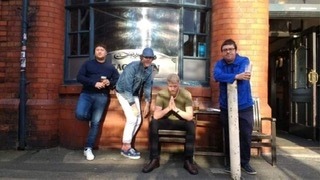
We’ve got Binns, frontman of the band with us. Alright man, how’s it going?
Good mate, just trying to adjust to this new world we live in as well as trying not to drink too much.
You guys have recently, over the year or so returned to the scene after a long time away. What made you come back and how would you compare the music scene now to how it was then?
Long story shortish...after we split from Sony we carried on for a few years but all wasn’t well within the band and cracks had started to show and we split in 2010. Even though we we’re all best friends the heartbreak of the split with Sony caused us to start blaming each other. We didn’t speak with each other for 8 years pretty much but there may of been an occasional text etc. Then in 2017 Stevie invited us all to his wedding and 3 of us decided to go and as soon as we saw each other we realised that the magic was still there. We decided to book a rehearsal room and see what happened, I contacted the other 2 lads they didn’t want to do it so we moved on as a 4 piece. Soon as we started playing we knew we wanted to play some shows again we had unfinished buisness. We booked a comeback show at the Old courts and sold it out it was only meant to be 1 show but because of the reaction we decided carry on.
The music scene now is completely different, it’s not enough to just be a musician anymore you’ve got to be so many other things. If you want to be successful, social media manager, record label owner, video director etc it’s great in the way that you don’t need to have a big label to release a record but it’s more difficult to really make a mark if you don’t know all the other stuff. But at the same time there’s always new music to listen to and new bands coming through. I just wished a few more of them would get the credit they deserved.
It’s mad how when we originally came through all it was about was finding a label now you can run your own label from a phone.
A real shame it didn’t work out with the label though isn’t it. Why do you think that was?
Yeah mate it just wasn’t the right time. Labels were losing so much money especially the big ones. Mad thing is we had our pick, we met with 6 labels 4 majors and 2 big indie labels. We could of picked any but unfortunately we chose wrong. If we would have had a manager in place before signing I reckon we would of signed elsewhere.
The Suzukis were on Deltasonic during their career and Moco we're well liked on the scene so Wigan bands were being looked at it seems.
Every band wants to sign to a major (in theory) but so many smaller labels do well now, Modern Sky are doing well with the bands they have on their roster. Are they a label you will approach?
We are good friends with Pichilingi who runs the label. We nearly signed to him and his previous label Robot.
The plan was to get the record off Sony and put it out on Robot. So Pichilingi paid for us to go to Wales for a week to record B-sides.
We recorded ‘Middle class masterclass’ on those sessions but couldn’t get the masters for the record in time and due to this it didn’t get released on Robot.
You mentioned interest from other labels, any stories about that?
When we were signed , Atlantic offered us a pretty big US deal including publishing. We turned it down because we were told Sony wanted us to sign a global deal with them so we missed that boat as well. It’s mad, I genuinely think we were cursed!
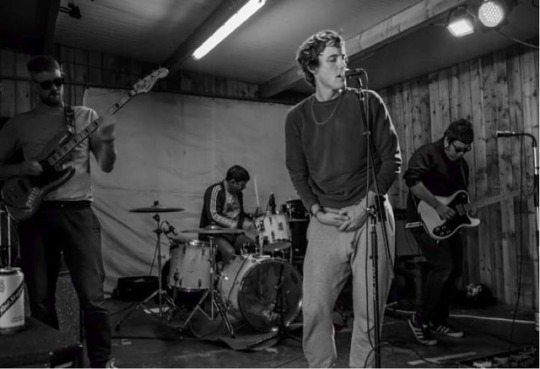
During the time you were signed to a major label like Sony, how was it? What positives have you taken from that experience?
It was mad really everything happened so quickly we had only been together 6 months with that line up we didn’t have a manager or anything and we started getting label attention. It was weird, after the first label reached out to us it felt like a different label was in touch everyday and were gradually getting bigger and bigger. It got to the point where we were playing small shows and people from Sony or Parlophone were pretty much the only people in the crowd, in-fact once we played a small festival on the back of a wagon in Ribchester which is near Preston and there was A&R from Sony there. We were all pretty intoxicated as we had been drinking all day and we pretty much told him to fuck off because we thought he was lying. Mad really, it got to the point where we had spoke to pretty much all the major labels and quite a few of the big indies.
Being signed was amazing at first. We got to quit our jobs and got paid for pretty much rehearsing and writing all day, it was the dream. We had all come from working class backgrounds and had that work mentality so we treated it as we would a normal job. We had a rehearsal room just outside Manchester City center and we would practice Monday to Friday 9ish till gone 6 everyday and learnt a lot in that time. I think it stands us in good stead today, we just fit together now we all know each other as musician and know exactly what each other are thinking on stage. We could go weeks between proper practices but as soon as we play it’s like we’ve been playing everyday.
In regards to our experience, like I said, it was amazing at first all our dreams had come true but it started to become frustrating. At about 8 months in, before we signed, we had a huge amount of momentum. Labels were all over us. We were selling all our show’s out, our MySpace (remember that) was going mad at one point we were getting about 600/700 plays a day which at the time was huge. We were playing every week, sometimes twice. We had just been mentioned in NME as part of the radar page and clash magazine had named us ones to watch. Then we signed the deal and the label told us to stop playing live and spend the next 6 months writing our album with the promise they would put everything behind us when we’ve finished the album. That completely derailed all the momentum we had built. We stopped booking shows and spent everyday writing and we wouldn’t see anybody from the label for months, when we did they would tell us yeah we’re speaking with producers about the album. At one point it genuinely looked like we were recording the record with Butch Vig in the US, well that’s what we got told. We had started to look at visa’s and stuff but then that went quiet. We had a manger at this point it was Phil Saxe who had managed the Happy Mondays and worked for Factory for years but he was appointed by Sony so he had his hands tied. Anyway, it got that bad we started to book some shows on the sly and we booked ‘in the city’ not on the main stage but one of the fringe shows we smashed it and had another raft of labels approaching us asking what’s the deal with Sony. We even got named as one of the acts of the festival by Clash Magazine. We hoped this would give Sony the kick up the arse they needed but it wasn’t. It’s key to mention, this was the mid noughties and illegal downloading and counterfeit Cd’s where rife. There was no Spotify or Apple Music and the labels were losing huge amounts of money. Sony had just put out kasabians second record and lost a huge amount of money on it . We had heard that a few our our label mates had been offered settlements to terminate there contracts, The Go Team and infact Primal Scream. So the label had started to cull less profitable bands. We had a meeting and got told they were still happy with us and to keep preparing the record so we cracked on for another 3 months but nothing happened and we still weren’t playing regularly. It was then we got an offer.
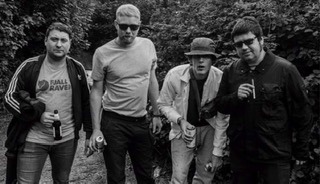
3 or 4 months after we left, Mani asked us to go and play a show he had put on. We played and the same A&R guy we told fuck of back in Ribchester who we had since become friends with came to watch us. He’d lost his job as part of the cuts and he told us that one of the reasons the label initially signed us was because they saw us a threat to Kasabian who were also on Sony and they wanted to keep us out the hands of other labels.
Which looking back made sense because early on in signing us they started asking us to write some ballads etc which we thought was strange.
Definitely seen the highs and lows of being on a label there. If you were in a new band starting out now, knowing what you know now, what advice would you give them? And also looking back, would you do anything differently?
Trust your own instinct definitely and don’t rush it. Wait to make the right decision and don’t get blinded by the lights. The music industry was a different beast back then it wasn’t as easy to put your own stuff out streaming services were in their infancy as was social media and you needed a label to release music properly. Just take your time and release your own music and don’t get obsessed with getting a label you don’t need them anymore you’ve got google.
The one thing I will say though is gig as much as you can, don’t refuse shows big or little even if it’s in someone’s back garden, play it. That’s why we got signed because we played everything, 2 or 3 gigs a week but never really got any money. We did it for the love of it and the crowds just got bigger and bigger.
Would we of done anything different, yeah we would of taken our time and not rushed. We got blinded by Sony a little before we signed. They sorted us a manger and took us to loads of fancy London parties and paid for everything. It was amazing but it was all just buttering us making sure we didn’t go elsewhere and it worked at the time we had the pick of the labels indies, majors, big indies the lot. We should of listened to what they had to say but we got blinkered. It could of been a completely different story if we would of given one of the other labels the time.
Great advice that but you make a important point about the strength of social media and labels not necessarily being as important as they were. Though there are some good ones about especially indie labels. I do believe in gigging as much as bands can, obviously do your research first and network with bands from other towns first maybe.
Can we talk about your new material? How’s that sounding? And also how much are you releasing and how are you going to about it?
Yeah it’s sounding really good mate. We’re super happy with it. We were always more experimental and been influenced by more than just guitar music. We loved dance music, hip hop, garage etc back in the day. We had a huge set up with loads of analog synths and drum machines only problem was we never really worked out how to use them properly so we were limited and never really got to the sound we wanted.
In a weird way though it worked and give us a kind of rawness at the time.
The difference is now in 7 or 8 years we were apart I got more into the electronic side of music through the likes of four tet, Jamie xx, SBTRKT. So I decided to buy a MacBook with logic and teach myself how to use it with the aim of doing something on my own. In that time I wrote and wrote learning more and more how to use it properly. I never planned on doing anything solo and when we reformed I had a raft of ideas to take to the lads. I wasn’t sure how it would translate with the lads because it was a lot more routed in Dance music with loads of samples and more modern drum patterns but they litterally lapped it up. We managed to build songs really quickly and I’d say we sound more Dirty Circus now than we did when we recorded the first record.

We’re going to release our first proper new music in over 10 years in August. We’re putting it out on our own label ‘Clap it off’ and we’re hoping we can do a video etc. It’s an absolute summer banger hugely influenced by Chicago house and punk rock! With the new stuff, I always say imagine Jonny rotten on ecstasy in the hacienda. The plan is to do it old skool like a lot of the late 90’s bands we are into and do the single with 3 or 4 remixes on it and here’s a world exclusive...it’s called SUNSHINE.
After that we’ve basically got another 5 songs in various stages of mixing but the plan is to do another single after this then put everything together for an EP.
Unfortunately, everything costs money so things don’t move as fast as they would do if we had a label behind us but we’ll get there.
We’ve got a point to prove and that’s what we want to do with these songs.
Well, there you go people...some exclusive news! I love the sound of that though the Johnny Rotten comparison. Is the songwriting process much different to how it was back then?
Not really just a bit more advanced plus there’s only 4 of us now as opposed to 6 back in the day. It’s usually starts with a synth line or drum machine loop then we build it up from that although we have loads of samples and loops we still structure the song pretty traditional. A little secret...we got a deal and we didn’t have any verse lyrics to the songs! I used to make them up every gig and freestyle them. We had choruses that were always the same and a melody but I genuinely used to make the verses up on the spot.
That’s mad innit, but you got away with it and was enough to impress people.
You’ve told us so much about the band and the stories of the highs and the lows of the band.
We’re gonna end on some quick fun questions...
What venue would you love to play?
Wherever you could fit as many people as possible. Not bothered as long as there is 60k+ people watching.
id like to do a massive hometown show in Wigan at the DW or something.
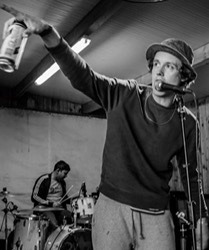
Streaming or Vinyl?
Streaming
If you could gig with any band (alive or dead) who would it be?
It’s difficult, but probably peak Happy Mondays, around 89-90 era.
Facebook or Twitter?
I’m personally more Instagram, but out the 2 Facebook, just.
Thanks for taking the time to chat to us, we’ve learned so much about the band!
Thanks for everything mate. Thanks for all the support over the last few months mate.
0 notes
Photo






The students of Grade II B displayed their talents in the assembly.
Nupur Mathur shared the thought for the day.
Kushaghra Tiwari recited the special prayer.
Viraj Akula, Sasha Vig, Dakh Veesamsetty, and Adwait Kumar Dan read and analyzed the news headlines.
Arshi Agarwal presented her skills on the hula hoop.
Mahika Mohta sang a song.
Bal Tanush displayed his prowess at completing the rubik’s cube within a minute.
Daksh Veesamsetty, Nupur Mathur, CH Mokshada, Adwait Kumar Dan, and Kushaghra Tiwari presented a group dance.
Ch Mokshada shared the birthdays of famous personalities born on this day.
0 notes